Humanities & Social Sciences
Journalism Department Holds Annual Media Convention 2023: Youth, Media & Communication Professionals Challenged to Harness Digital Media to Preserve Culture
Published
2 years agoon
By
Jane Anyango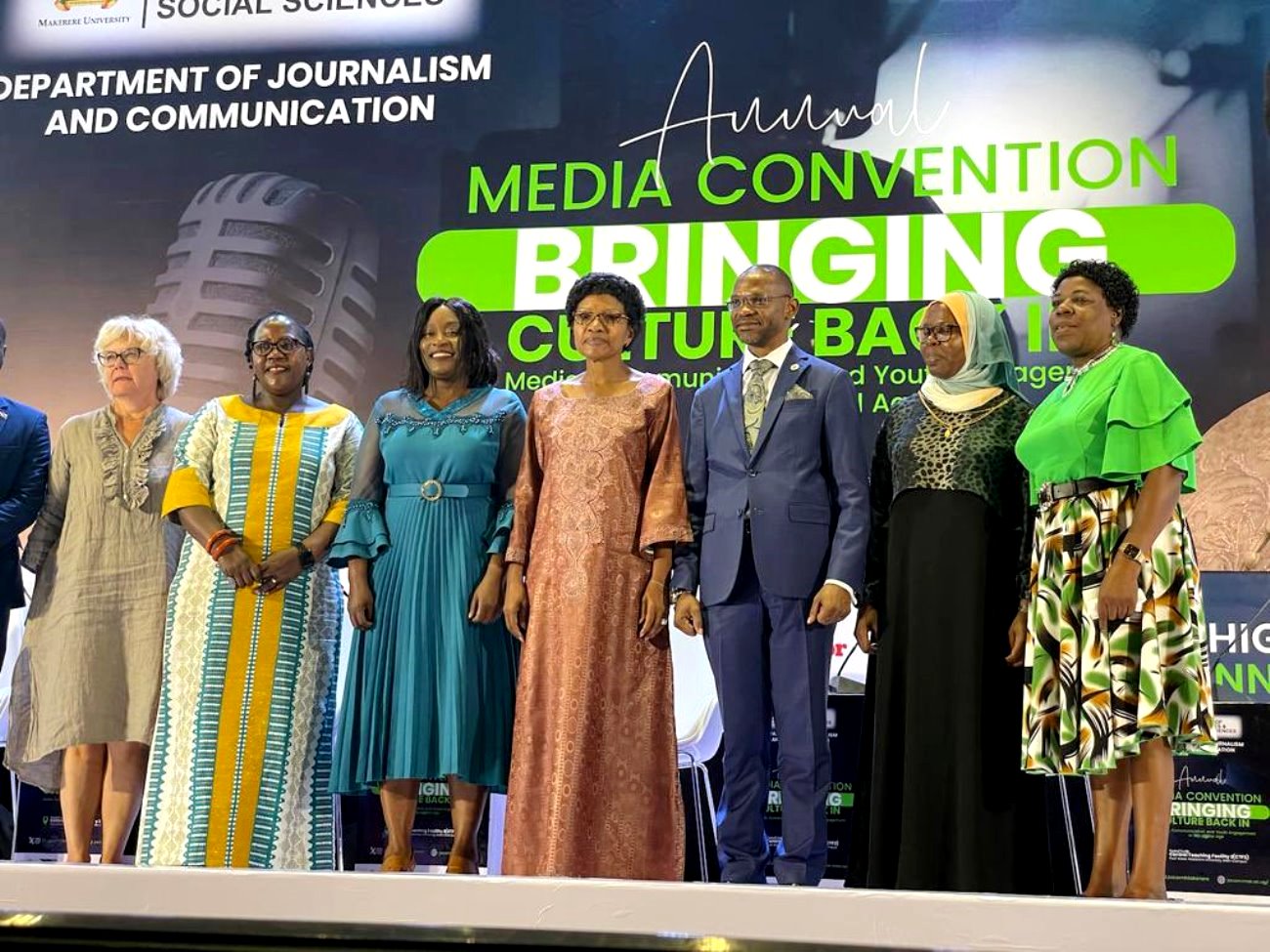
The College of Humanities and Social Sciences (CHUSS) through the Department of Journalism and Communication on 12th October 2023 hosted the Annual Media Convention at Makerere University Yusuf Lule Auditorium. It was convened by Dr. Charlotte Ntulume.
The function was presided over by Her Royal Highness Sylvia Nagginda Nnaabagereka represented by the Trustee, Board of the Nabagereka Foundation Ms. Judy Kamanyi under the theme,” Bringing Culture Back in: Media, Communication and Youth Engagement in the Digital Age”. The Head of Corporation, Norwegian Embassy and the Vice Chancellor Makerere University also graced the occasion.
The key note address was delivered by Associate professor from the University of Johannesburg who runs the School of Communication, and also head of Department of Strategic Communications at the University of Johannesburg and, one of the pioneers of the Department of Mass communication at Makerere University, Prof. Elizabeth Lubinga Nviri .
The function was also punctuated by three panels. The first panel on , “Media, Entertainment and Culture: Looking back into the Future”, moderated by Dr. Evelyn Cindy Magara comprised leading practitioners in the music, art and film industry including Dr. Charles Mulekwa, Mr. Andrew Benon Kibuuka, Ms. Joanita Kawalya Muganga and Mr. Abbey Mukiibi.
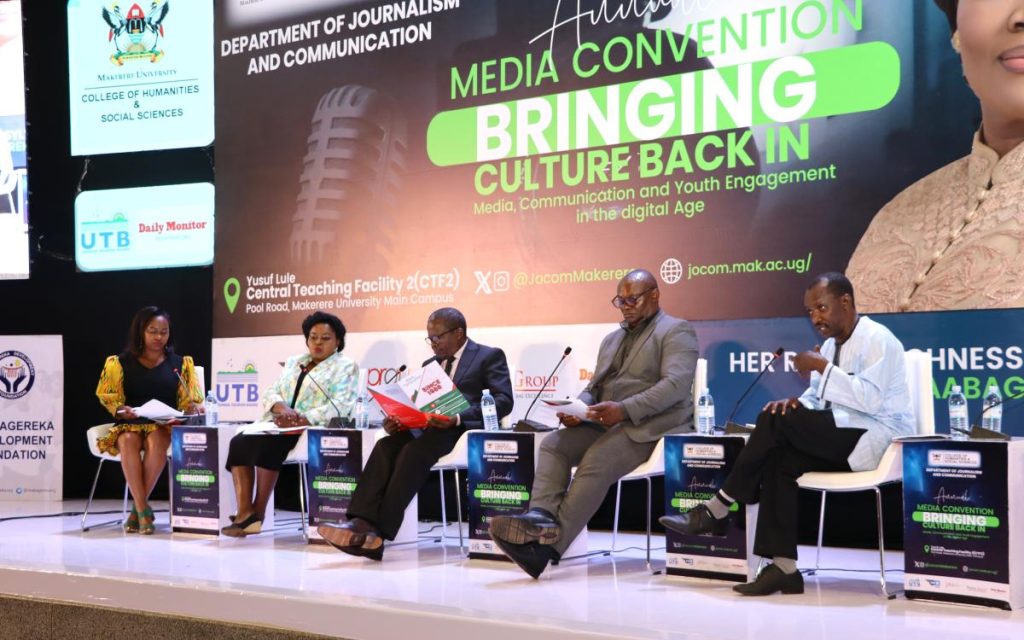
The second panel on, “Young People and Culture in the Digital Age” moderated by Hannah Arinaitwe consisted of students including Sylivia Nankya, Najibu Nsubuga, Reagan Kiyimba, Andrew Sebunya and Cynthia Ashaba.
The third panel on, “Media and Civic Engagement” , moderated by Charles Odongtho brought together leading media practitioners including Dr. Jimmy Spire Ssentongo, Ms. Lydia Mirembe Jadwong, Ms. Halima Authman, Ms. Carol Alyek Beyanga and Ms. Agatha Atuhaire.
The event was crowned by the students Excellence Awards presented by representatives of the Newvision, Daily Monitor and the Public Relations Association of Uganda. Three students scooped plaques, some with cash and internship opportunities.
The event was supported by the Uganda Tourism Board, the Uganda Civil Aviation Authority, the Daily Monitor, the New Vision, and the Public Relations Association of Uganda.
The Nnabagereka calls for cultural revival as an important and a matter of urgency
Representing the Nnabagereka of Buganda, the member Board of Trustees on the Nnabagereka Development Foundation Ms. Judy Kamanyi described the theme of the convention as important and timely.
She said the cultural heritage is the embodiment of our nation’s history, values, traditions and collective identity.
“It encompasses the stories passed down through generations, the songs that echo in our hearts, the customs that connect us to our roots, the ways in which we are raised and taught to behave in our respective communities society, and the wisdom that guides us through life’s journey. It is a source of pride, a reflection of who we are, and a legacy we have proudly inherited from our ancestors. Our culture is our source of inspiration as a people.”
Ms. Kamanyi noted that contemporary society, is undergoing rapid change in every aspect, from how children are educated to the world of work with ways of living, cultural heritage, facing numerous challenges.
The onslaught of globalization and the widespread influence of modern technology according to Ms. Kamanyi has ushered in by digitalization which have sometimes overshadowed cultural heritage.
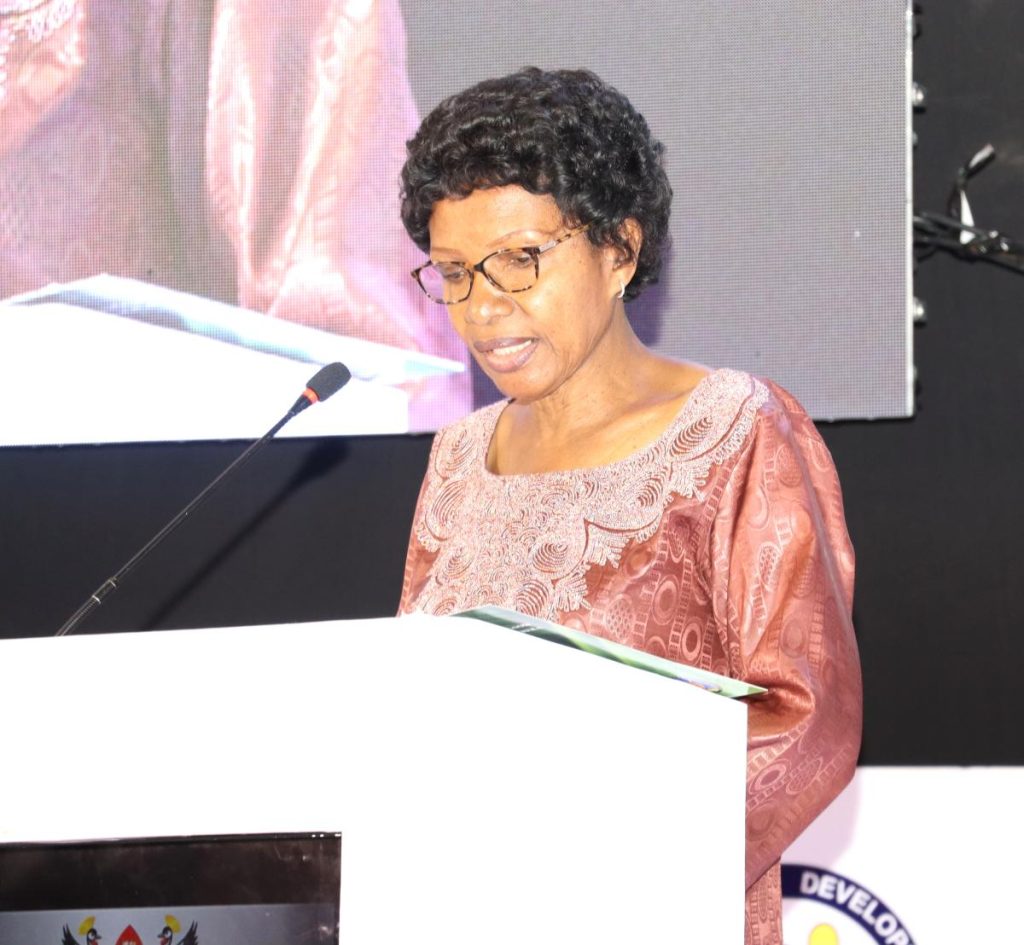
The digital era, she observed has reshaped the way people live, communicate and interact with the world, thus intertwining lives with technology, from the mobile phones to the platforms used to connect with one another.
While these innovations have undoubtedly brought people closer together, she noted, they have also led to the erosion of some aspects of culture. While this digitalization has brought incredible achievements, advancements and opportunities, it also poses a significant challenge to the preservation and promotion of cultural heritage.
She informed participants that the discussion on how we can bridge the gap between culture and the digital era through media, communication and youth empowerment and engagement is urgent in our country’s quest for social transformation.
Aware that media plays a pivotal role in shaping perceptions and understanding of the world, informing decisions and influencing values, Ms. Kamanyi reminded participants that media has the power to either erode or celebrate cultural diversity and heritage, but at the same time, it can be a powerful tool for cultural preservation.
“To bring culture back into the spotlight, we must recognize and harness the potential of media as a guardian and promoter of our culture. This is especially critical in this digital age where media, especially online and social media, has been used to spread stereotypes and misconceptions.
As professionals in the industry and to the students who are training to become media and communication specialists, we have a duty to address this problem. Media in all its forms, including the tradition or legacy newspapers, radio and TV, as well as online outlets, have a responsibility to represent our culture accurately and respectfully”, She guided
Ms. Kamanyi observed that some of the unintended consequences of globalization and the digital age is the erosion of indigenous languages.
Ms..Kamanyi reiterated the need for people to route themselves in their languages expressing pleasure to see that different languages are being taught here in Makerere University.
“We cannot talk about preserving our cultures or having an identity without preservation of our languages. I therefore urge you to promote and preserve our languages in the family, in our homes and in our communities and in our schools. And I commend the media playing a lead role in this important task through various local language media platforms and programs. I also applaud the School of Languages, Literature and Communication here at the University, which hosts the Journalism and Communications Department, for all its efforts to preserve and promote indigenous African languages.”
Turning to cultural preservation, Ms. Kamanyi said it is incumbent upon communication professionals to provide the right environment, whether in traditional media or online, and in the different spaces in which they practice, for these inter-generational interactions or engagements to take place.
Universities tasked to develop programs to engage youth in cultural activities
Acknowledging that the greater majority of Uganda’s population belong to the younger generation, Ms. Kamanyi recognized the older generation with wealth of cultural knowledge She expressed the need for the youth to continue engaging and dialoguing to ensure that traditions are not only preserved, but also adapted and integrated into modern lives.
“We are fortunate to live at a time when communication and connectivity are part of life, and therefore social networking sites are the order of the day, and often time we take this for granted” she said
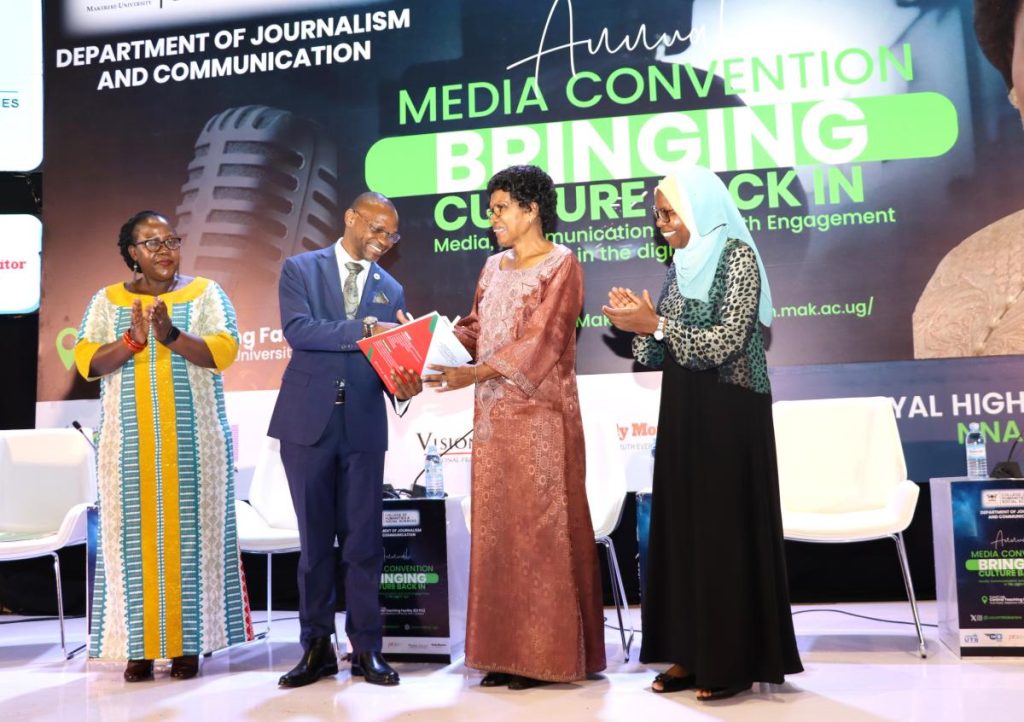
Turning to youth engagement and the youth as torchbearers of our culture, Ms. Kamanyi stressed that it is important to engage the youth in cultural promotion and for preservation and the continuity of heritage as they hold the key to cultural resilience, adaptability, and agents of preservation and promotion and,also breathe life into it.
“It is my appeal therefore that this country’s leading university and chief custodians of education, knowledge and innovation to be intentional about creating
mentorship programs and educational initiatives that empower youth to actively engage in their culture”
I beseech you to add culture preservation to your priority of research interest. Her Royal Highness believes that this should be supported. To the students, please pay more attention to culture as a matter of utmost importance and urgency.”,
Uganda in need of revival of cultural values
Uganda, like most African nations, Ms. Kamanyi said, has suffered social upheaval. and disruptions, there is a breakdown in ethics and values which has led to moral decadence and deterioration of social cohesion in society.
“If we took a critical and honest look at ourselves, we would admit that as a people we have somehow lost some aspects of humanness. With the grave decline in acceptable behavior, especially when it comes around digitalization, I strongly believe that transforming our nation will entail a revival of our cultural values.”
She said although culture has always been around, there are certain aspects that have kind of receded and hence, the need to bring them back to the fore.
To this end, she added, Obuntubulamu, which is the African philosophy that espouses interconnectedness, humanity, dignity, and communal living, was integrated in Ekisaakate- the flagship program of the Nnabagereka Development Foundation that targets the young people.
Several societal values that make up Obuntubulamu were identified through research, and these are humility, civility, integrity, honesty, sense of shame, responsibility, among others.
With the support of UN Women and the United Nations Development Program, the Nnabagereka Development Foundation partnered with other cultural institutions in Uganda, including the Kingdoms of Acholi, Alur, Bonyoro, and Busoga, with an indigenous approach to achieving the 2030 Agenda for Sustainable Development, that is the SDGs.
The Foundation has also worked, and Her Royal Highness, with other African queens and cultural women leaders from the kingdoms of Ghana, the kingdoms that exist in South Africa, Lesotho and in Nigeria, mindful that they had the power to use their status in society to influence and improve the lived realities of their people.
How can we harness media technology for cultural revival and cultural heritage preservation in the digital era?
According to Ms. Kamanyi, there are unprecedented opportunities to bring culture back into the limelight using social media, the internet, podcasts, digital storytelling to amplify cultural messages to reach a much wider national and global audience.
There is need to encourage the creation of digital content, that celebrates our culture, to engage the youth, and invite the world to explore our culture.
“Through the strategic use of technology, we can showcase our art and our music and our customs to a wider audience, promoting a deeper appreciation of our cultural diversity. The digital revolution has brought new non-traditional players in the media and communication arena.
These include the digital content creators, all producers and influencers. And young people are at the forefront in this space. I therefore implore the Department to continually equip students with the requisite skills and, even more importantly, ethics for these crucial roles.
You and your associates in the humanities field are best placed to instill a sense of pride and identity among our young people, while almost equipping them with skills needed to navigate the digital era, yet stay rooted in our culture”. Ms. Kamanyi stressed
Ms. Kamanyi highlighted challenges that come with preserving and promoting culture in the digital era. The rapid space of change and the spread of misinformation and the lure of globalized cultures, and the risk of cultural appropriation are hurdles that must be navigate.d
She however said, these challenges are not insurmountable.
“We need to embrace technology as a tool for cultural preservation rather than perceive it as a threat. With regards to solutions, I request the Department of Journalism and Communication to ponder on these challenges. At 35, surely society naturally expects you to have achieved some milestones. You are at a stage where your impact on society should be visible in many aspects and especially matters being discussed today.
I implore you to spread your reach and influence so that your impact in our nation is visible. We are looking up to you to provide professional guidance to the students, cultural associations at the university, like in Nkoba Zambogo, to make culture visible on the university’s agenda, and to encourage our young people to embrace culture with the same vigor and interest with which they have embraced digitalization and globalization.
I wish to emphasize that it is our collective duty to ensure, as our ancestors did, that the transition to modernity does not come at expense of our cultural identity and heritage. Our cultural heritage is not something of the past that we can relegate to the sidelines, but it is a living entity that should evolve with the times, that can drive national transformation.
We must factor culture back as we navigate the digital era, not just as a matter of preserving our past but about securing our future. Our cultural diversity is a source of strength, resilience and inspiration. Let’s work to embrace and promote our culture. Together, we can build a future where our national identity thrives, where diversity is cherished, and where cultural heritage is a driving force for positive change and for our country’s transformation.”She appealed.
VC commends DJC steady growth
Representing the Vice-Chancellor of Makerere University, the Deputy Vice Chancellor in charge of Academic Affairs Assoc. Prof. Umar Kakumba appreciated the distinguished alumni and panelists for the wonderful and exciting engagement and insightful discussion rendered.
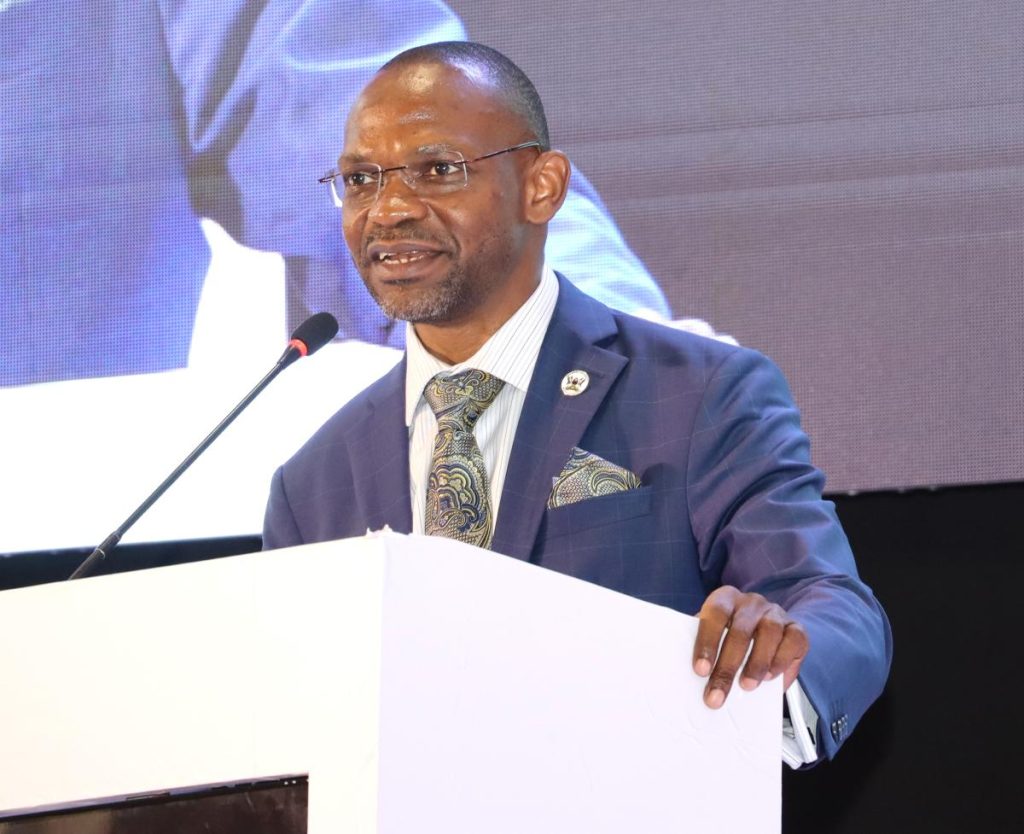
Kakumba, welcomed Her Royal Highness the Nnabagereka to Makerere University as guest of honor at the annual media convention 2023represented by Ms. Kamanyi and the entourage of the Nnabagereka thanking the team for accepting this second invitation to preside over this media convention, who, in a few weeks ago officiated the Sarah Ntiro Memorial Lecture.
“We want to appreciate the honor that is rendered to Makerere University, Mama Nnabagereka”
Prof. Kakumba appreciated the organization of the Media Convention 2023 and hailed the department for remaining consistent in holding this informative and educative activity every year, save the couple of years of COVID-19.
“Journalism has remained consistent and intentional. We also want to applaud you for bringing in our distinguished alumni and the keynote speakers, Professor Elizabeth Mviri Lubinga, all the way from Johannesburg,..and I also want to assure you that the University of Johannesburg and Makerere University have an ongoing collaborative engagement. We have a formal MoU. And so getting you as the head of strategic communication at the University of Johannesburg and getting you as our alumnus and proud ambassador of Makerere, it’s such a great pleasure.
And we hope that your well-delivered and insightful keynote, will definitely open more doors of collaborative engagement between journalism and communication, a school at Makerere here, and also fostering the existing relationships that we have with the university and many opportunities that will come our way”, The Vice Chancellor appreciated.
Kakumba thanked the panelists, for the participation and for their insightful and being very resourceful in tuning the audience into the digital era and how the challenges can be moderated.
“I note the challenges of the digital technologies in strengthening culture, but also in strengthening the role of the academy in mentoring our young people, the future generation of many times, of our times and the future.
I wish to salute this event, that it has also built a strong confidence over the years that the Convention has been held, the confidence has been built, but it has also helped to nurture the continuous engagement and appreciation of the role of media in transforming society”, He hailed :
Professor Kakumba commended the Department of Journalism and Communication for the remarkable endeavor, having risen from just a sub-program, not even a section or a unit under the Literature Department then in 1988.
“I want to appreciate the remarkable endeavor in growing this sub-program under the Department of Literature in 1988 to a fully-fledged Department of Journalism and Communication with enviable programs. programs in journalism and communication, which was re-branded, but also the two strong graduate programs, the master’s degree in strategic and corporate communication, and a master’s degree in journalism and multimedia, and a productive PhD in journalism and communication”,
“ I have been informed too, that the department is partnering with the School of Public Health to develop another Masters in Health Promotion and Communication, and which is interdisciplinary, which is very important. Journalism, health, because journalism, communication, communication is a critical tool in transforming society. So the role of the media in health, the role of communication in health, the role of communication in culture, the role of communication in business and entrepreneurship cannot be overstated.” He stressed.
Kakumba assured the department that once that program proposal comes in handy in his capacity as the Deputy Vice-Chancellor, they should be able to fast-track it. The DVC chairs the Senate Committee on Academic Programs, Policies, and anything to do with the business of the Senate.
“So we’ll be much more delighted to have that proposal as we are completing the proposal for the Council Restructuring Committee. And indeed Journalism and Communication should should have been a school many years ago, but better late than never. We’ll appreciate that.”He pledged.
He also recognized the college, schools and departmental leadership for the well elaborated and illustrious efforts, guidance and achieving various milestones in the departments and schools of the college.
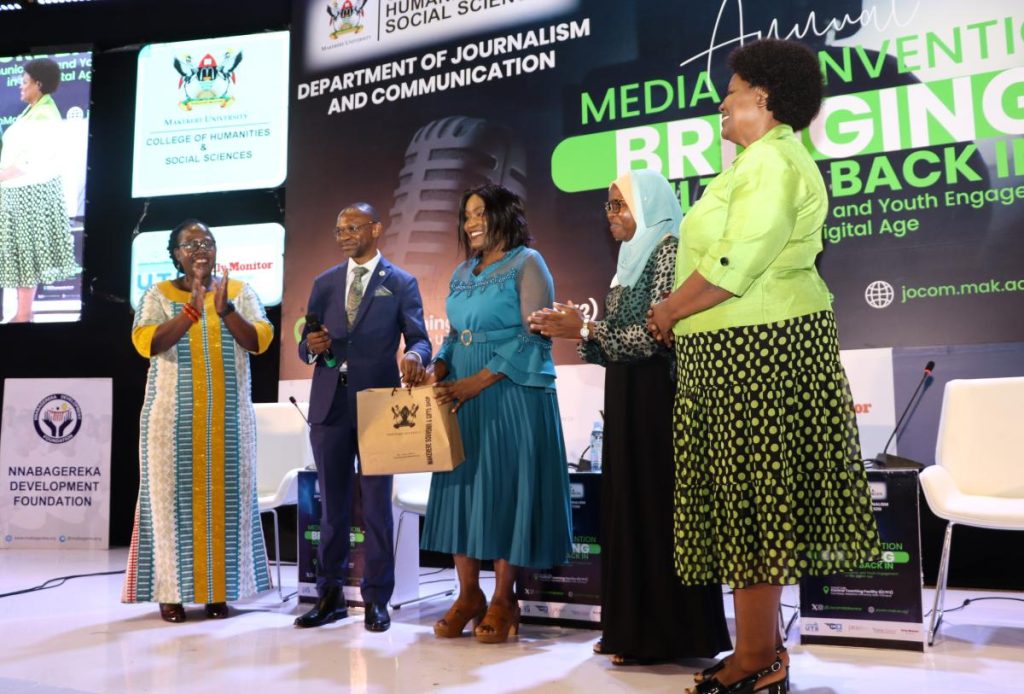
“The five schools of the college, the over 14 or 15 departments in humanities and social sciences, have really exhibited quite much in fostering our future, our vision as the institution, but also in demonstrating what the university has been able to do in building human capital development for our country and our region.”.
The professor was pleased with today’s theme, bridging culture back, noting that culture has not gone away at any time but probably culture has been alienated.
He said, the idea of reimagining culture into the digital era and how culture can be made more useful in building a strong foundation for the young people and how culture can also strengthen the modern era of communication has been well expressed by the panelists in creating the enterprise, the future of the enterprise and the future of the business, but a business that should not completely be away from strengthening a society that is productive.
“So definitely it speaks to the theme that you have selected, bringing culture back in media, communication, and youth engagement in this digital age. It speaks to the impact of the fast advancing technologies of our well-being as a community, as a country, as a nation, as a region, and as a continent, and what culture can significantly contribute.
I am certain that the discussion at this convention will open our minds more about issues to how to access digital technologies, the quality of the content that is made from time to time, and how that content can be enabled to support the roles of building our strong communities and building public participation and also engaging our development processes”. Prof. Kakumba explained.
The DVC said the university would want to see this engagement and how it turns out, in the productions that are being made, the content that is being written and migrated into knowledge that can inform progressive policy and regulation on digitizing the country and the economy.
In addition, the DVC said, the university would want to see how the discussions can promote the role of the media and the role of culture in preservation, in social change and empowerment of people. And also ultimately, it should be able to drive towards the sustainability of our culture and the transformation of our country.
On behalf of the Senate of Makerere University, Kakumba thanked Her Royal Highness, Mama Wa Buganda, the Nnabagereka for accepting to grace the annual media convention 2023,the continued passion and gratitude that is extended to Makerere University.
Kakumba also appreciated the Nnabagereka Foundation and all of the programs, and the love for working among the young people in educating them, in work, in health, the work in culture, including the Kisakate teacher, among the many programs that the office of the Nnabagereka has fostered.
DJC transition to a school should have happened 30 years ago-Principal CHUSS
The Principal CHUSS Prof. Josephine Ahikire said, the department transition into the school is is something that should have happened 30 years ago.
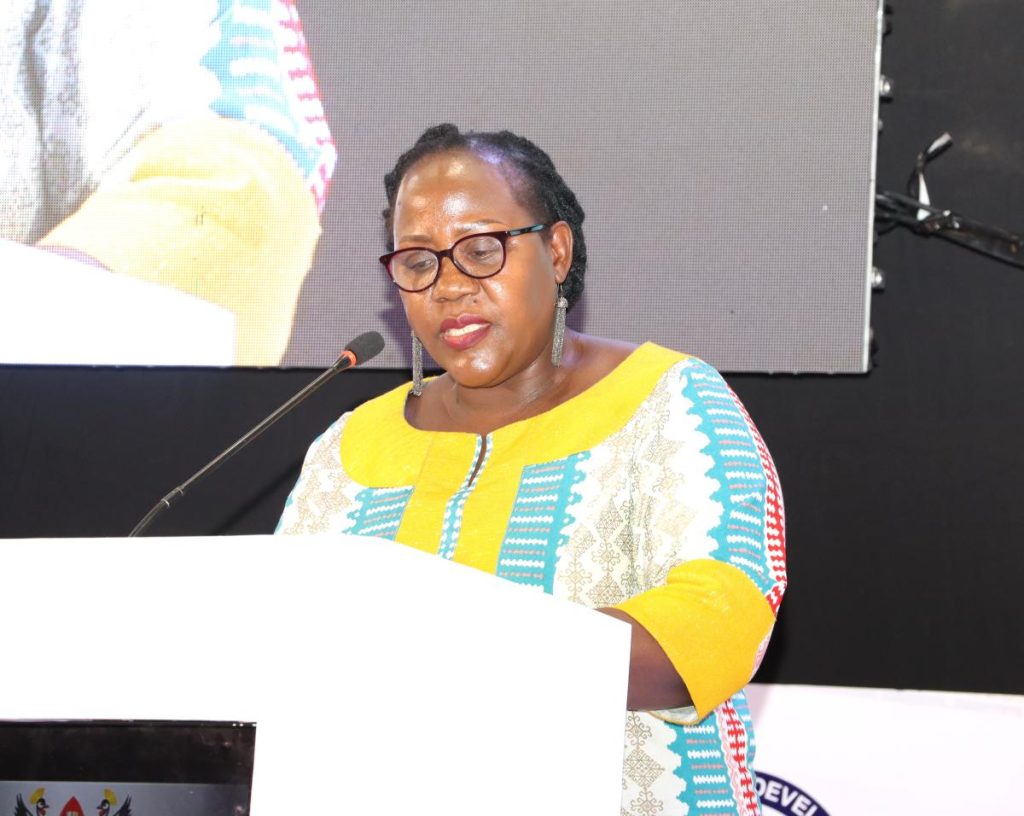
“So the department has had a lot of impact and as a UNESCO’s center of excellence in the region, East Africa, Sub-Saharan Africa and beyond has churned out a number of professionals serving in various capacities here in Uganda and beyond in the field of Public relations, communication, media and marketing.” She noted.
Prof. Ahikire said the theme of the convention was purposed to embrace the needs of young people in strategic communication, writing for society, not just for making money, but when when writing, they should have that mission in mind and be mindful of the peoples’ culture.
The Principal thanked the university management for the support to the college and to the department, and for enabling Makerere reimagine itself as a research-led university to be able to serve society to build for the future.
Dean commends the DJC growth, supports proposal to transform into a school
The Dean, School of Languages, Literature, and Communication, Associate Prof. Saudah Namyalo reiterated that the Department of Journalism and Communication (DJC) has organized this annual media convention since 1998, and each time it has provided a platform for discussing emerging issues in the media, journalism, communication, and society in Uganda and beyond.
“This year’s theme is timely as it speaks to the central place of culture in the digital communication era. Moreover, it allows the youth who are particular to Uganda as they are the majority population.
The theme also poses a very important question on the future of the media in the light of culture and entertainment. I’m therefore looking forward to the panels that are well constituted and are certainly going to exude the same clearly”, She said.
Dean Namyalo was happy to note that the Department of Journalism and Communication has grown immensely, especially in the last few years. Adding that it’s not surprising that at 35 years old, they have built their capacity to research, graduate training, and innovation in journalism, media, and communication.
“And I want to use this opportunity, Vice Chancellor, to inform you that the Department of Journalism has presented their proposal to transform into a school of journalism, media and communication. And we are in total support because they have all the right steps to become a school
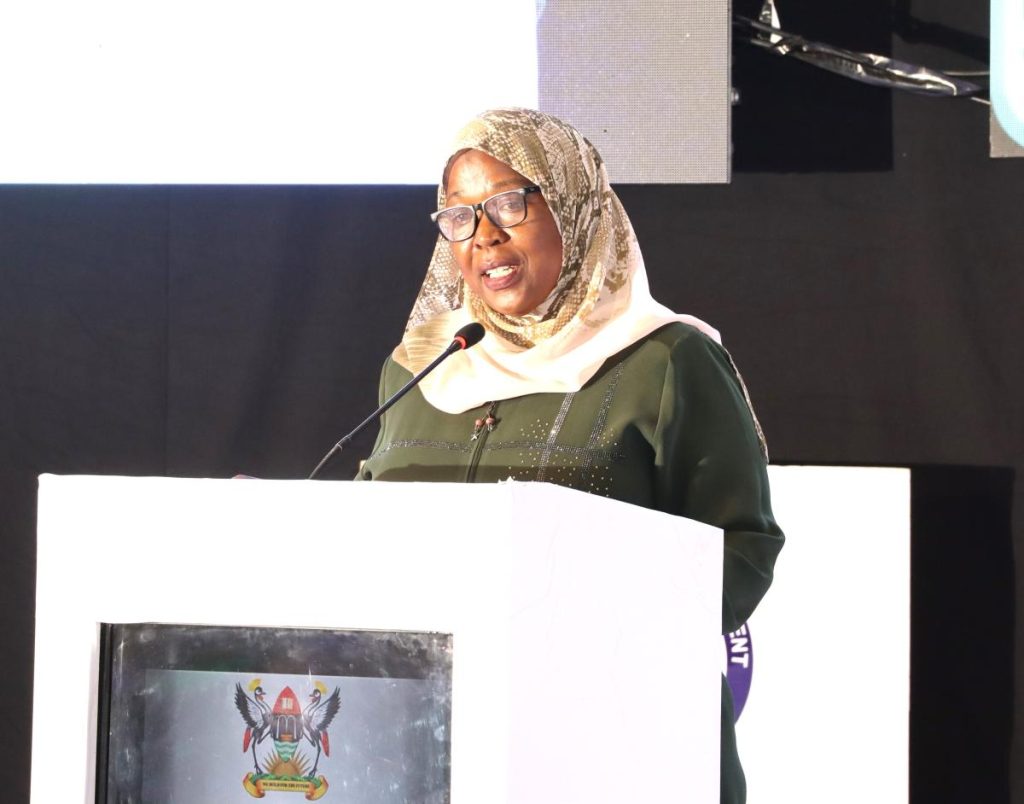
I am certain that they are a force to reckon in Uganda and in the region as well. As a school, we congratulate them on this and many other milestones and wish them even more success as they work towards building a future flying the Makerere University flag high and growing even further”, she tabled.
She thanked Her Royal Highness represented by Ms. Judy Kamanyi for accepting the invitation, aware that a few weeks ago, she was here again on a different occasion.
Convention as a platform for Debate on contemporary issues in Media and communication and guiding to curriculum review
The Head Department of Journalism and Communication Dr. Aisha Nakiwala said this annual media event brings together the academia and the industry players to debate contemporary issues in the media and communication.
“It is at these kinds of engagements that we regularly guide ourselves on what to include in our curriculum development. So for the last 35 years of the department and the program of journalism and communication,we have continued to be both forward-sighted and strategic in our approach to training our students and intentional to develop.
And as we look to the future, and specifically as we set ourselves to transition from a department to the school of journalism, media and communication, nothing can be strategic than a deliberate focus on the young people because they are not just great consumers of media content, but they are also the future of journalism, media and communication.”, Nakiwala said.
Dr. Nakiwala asserted that , there is strong evidence, about the strong influence of the media and communication on youth and culture. Thus, the rapidly changing media sector in Uganda and elsewhere in the world has conditioned the Department of Journalism and Communication, to view young people as an important site of cultural production.
She said, that explains why they chose to focus this year’s convention on the intersection between media, culture and young people.
Dr. Nakiwala appreciated Ms. Kamanyi, the office of the Nnabagereka, for accepting to offciate this convention .
“ And your being here and the support that we have received from the Foundation is testament to the great service that the Department of Journalism and Communication is rendering to the cause of young people and to the cause of national development in this country and beyond, which we know is very dear to the heart of Her Royal Highness the Nnabagereka. We therefore pledge our continued efforts in this exceptional service and in serving our clientele better,”The don promised.
Nakiwala thanked the various sponsors that have funded this event including the Uganda Tourism Board, the Uganda Civil Aviation Authority, the Daily Monitor, the New Vision, and the Public Relations Association of Uganda, without whom, it would be impossible.
She also recognized the diligent and meticulous planning that has gone into this event to make it a success giving credit to her team at the Department of Journalism and Communication, Dean, School of Languages and Communication and the Principal of the College of Humanities and Social Sciences for the support rendered to the department.
Dr. Nakiwala also thanked the panelists for honoring the invitaion and sharing their experiences and expertise expressing optimism that the deliberations will spark further debate beyond the walls and gates of Makerere.
Youth – a transformative power and catalyst for innovation and change – Keynote speaker
Delivering the keynote address, Prof. Elizabeth Lubinga Nviri was grateful for the strong foundation that she received from this institution, saying, it has helped us to be successful within and outside of the country.
Speaking on reimagining how culture can become an integral part of media communication and youth engagement in the digital age. Prof. Lubinga said already the world is moving towards the internet of things with artificial intelligence and robotics.
She congratulated the Department of Journalism and Communication for 35 years of organizing successful annual media conventions.
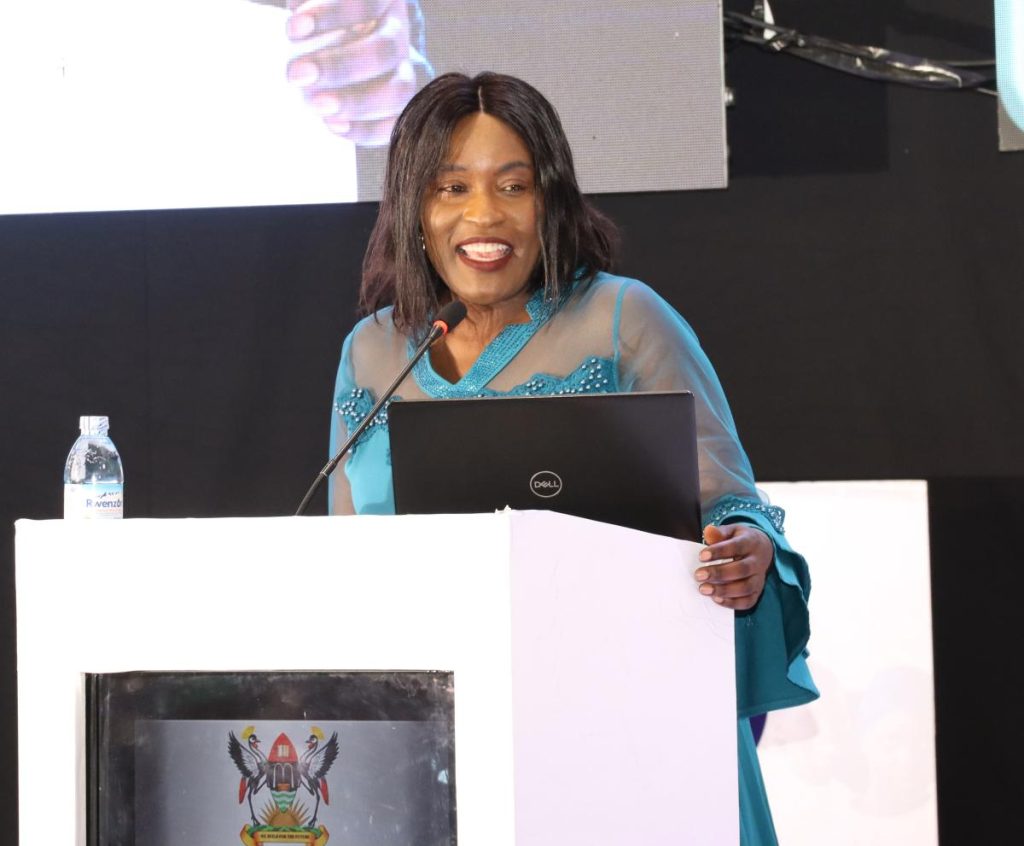
The intention, she remarked is to appreciate the transformative power of the youth as catalysts for innovation, for active participation and leadership in shaping the future of our country, Uganda.
“ It is not secret worldwide that Africa has the youngest population. 2023, Uganda’s median age is 16 years only. If you compare that to Monaco, for example, in Europe, with a median age of 55 years, it means that we have a very young population. And because of that, we would be remiss in excluding the youth in shaping our country”, she asserted.
To achieve this, she expressed the need to reflect on the role of change as inevitable, the critical influence of culture on individuals and society, the changing face of the media in this digital age, media audiences as well as the dynamic and rapid perversion of artificial intelligence.
“Change is inevitable. We cannot manage and control change. And we know that the youth are a very dynamic and a flexible audience that is open to change, socialization, acculturation, information, education and entertainment. We also know that change in society has been fast-tracked by digitization, socio-economic, environmental issues, among others”
Reflecting on COVID-19 pandemic, the professor said it changed the way in which the media operates, but at the same time it elevated the important role of culture in terms of treating COVID-19 to traditional medicine but at the same time, COVID affected media, a number of print media closed as they were not sustainable.
Prof. Lubinga highlighted that one of the constant variables of society is culture, because culture has been tried, it has been proved, it has been tested over a number of years. Academics, according to the keynote speaker acknowledge that culture is both individual but it’s also a social construct, because individuals vary in how they embrace and engage in attitudes, in values, in beliefs and in behavior.
Culture, she explained occurs if individuals act in harmony with particular behaviours or values. And in Uganda and other societies, there is a bidirectional relationship between the media and culture.
For example, she said, the oldest newspapers in Uganda, such as Muno in 1912 and Ebi Famu in Uganda in 1934, were premised on religion but also based on culture. There are also several culturally affiliated broadcasting and print media, including Central Broadcasting Services, radio, Uganda Broadcasting Services, television, Voice of Toro, radio, which is in both ownership and content reflecting Toro history and culture, and TV, loyal to the Busoga Kingdom, Rhino FM, Acholi cultural institution.
For many years she said, the media have has informed, educated, socialized and entertained society and have cultivated readers, listeners, viewers or consumers of our content. She however noted although today we still have consumers, there is a shift to what is termed as prosumers because prosumers co-create content, they actively participate in media making decisions.
Prof Lubinga also observed that many youth are techno savvy, and because of that they are at the forefront of processes using social, digital media, as well as artificial intelligence proficiently.
“The youth have to be involved in shaping the way forward, because they are more conversant with the digital and social media than everyone else is. So due to digitization, audiences, media and communication have shifted. receivers have changed to instant creators of content. Audiences have changed from passive receivers to influencers of crucial media narratives. Audiences have changed from listeners, viewers, readers to co-creators and innovators.
The media have converged and blurred. So we have to ask ourselves crucial questions. Who and what are the sources of information? Do we still say that the journalist is the source of information? And these are the things that we are going to debate in this convention. And so communication power is shifting from institutional communicators, journalists, public relations officers, to the influence of recipients” she said..
How do we re-imagine the interface between culture, youth and media in this digital age?
The professor suggested that collaboration between stakeholders should be increased with conscious inclusion of the youth, because no longer are the youth an apathetic audience. They are driving, they are shaping narratives on the ever-growing social media.
She proposed that youth voices should be integrated into co-creating strategies to improve development.
She also expressed the need to invest and harness artificial intelligence, social media, and digital media to preserve culture without excluding the youth through micro-engagement.
“We should consider a world where AI can do most of the jobs that we are currently doing. We already have digital news readers. Artificial intelligence can create content for us. So what do we perceive the world ahead of us to be? What is our role? We need to re-imagine our role. Micro-engagement enables users to interface with technological devices and systems, which takes place in various forms”. She advised.
Three journalists awarded
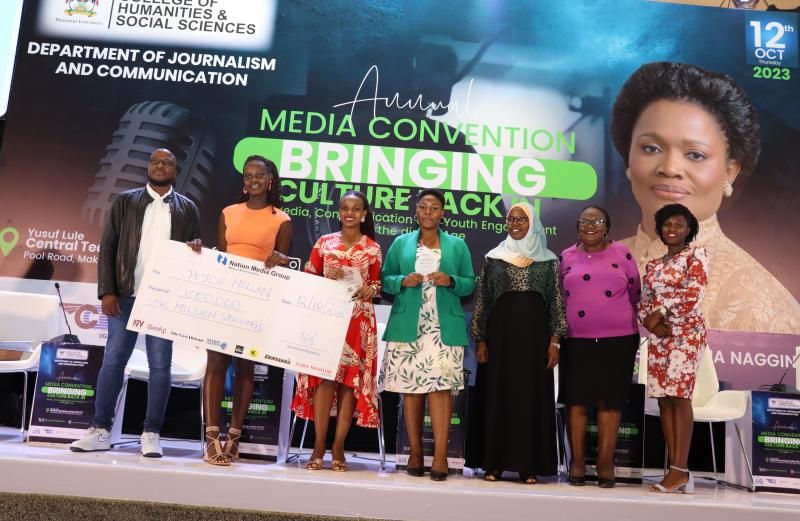
Atwine Rhonet, winner of the New Vision Cranimer Mugerwa Award
Atwine is a multimedia journalist in Uganda who is passionate about solution journalism. Currently, she serves as a health journalist at Solutions Now Africa, which stands as Uganda’s pioneering solutions newsroom. Her primary focus revolves around the creation of compelling narratives that spotlight the innovative models, systems, and solutions that are catalyzing positive change in Africa. Atwine has so far covered topics such as health access in a low-resource setting, Human rights issues, e-learning, congenital abnormalities, mental health, innovations, climate change, and neonatal health.
Handing over the award, the New vision Chief Executive Officer Don Wanyama thanked Makerere University, and specifically the Department of Journalism and Communication, for inviting them to hand over this award, saying it is very important.
Wanyama said , for about two decades, New Vision and the Department of Journalism and Communication have been recognizing the best performing journalism students through the Cranimer Mugerwa Award.
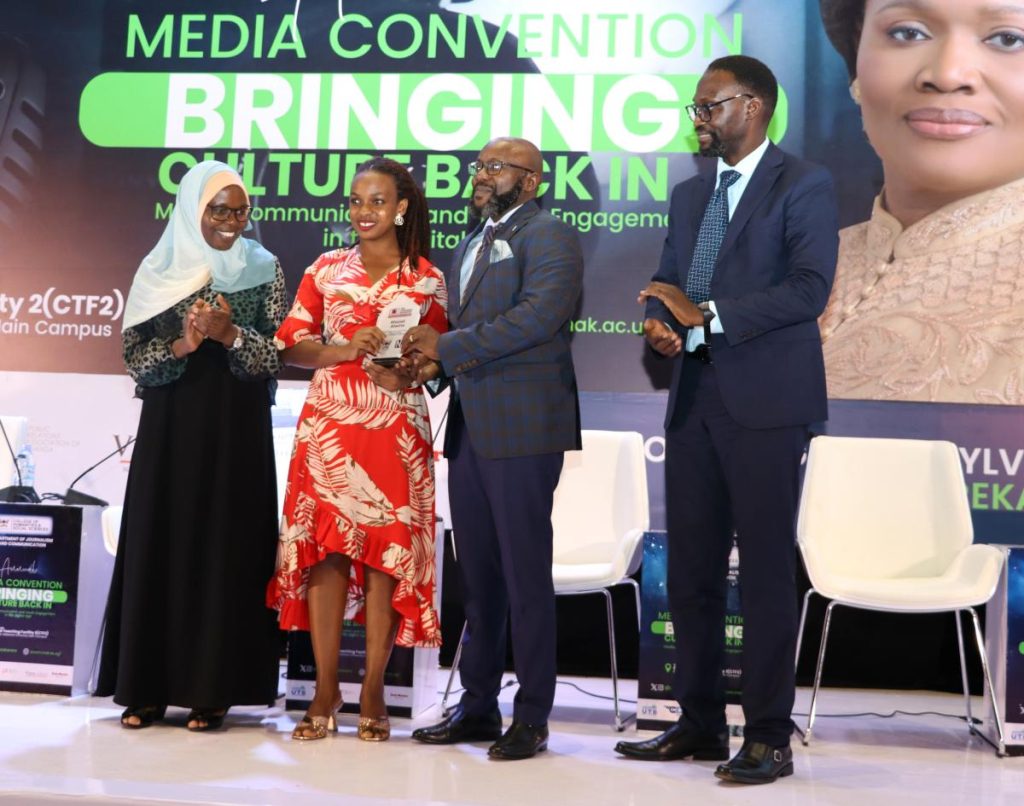
Cranimer Mugerwa was a photojournalist with the New Vision who died on March 26, 2001 at Nsambya Hospital after a short illness. He was known for his exceptional talent in capturing powerful and evocative images that told very compelling stories. He was a very brave war correspondent who fearlessly ventured into the war-torn regions, risking his own safety to document the harsh realities of conflict.
His photographs from the front lines captured the raw emotions and devastation experienced by both soldiers and civilians. His work that really stands out was his coverage of the Rwanda genocide in 1994. It was a testament to his unwavering commitment to shedding light on the darkest corners of humanity.
In the face of unimaginable violence and unspeakable atrocities, he fearlessly captured the haunting images of mass killings, displacement, and the indescribable grief of the survivors. His photographs served as a stark reminder of the consequences of hatred and intolerance, motivating the international community to take action and prevent such atrocities from happening.
Mugerwa’s indomitable spirit and determination to expose the truth will forever echo through his powerful images, especially for those victims of the regions of the DRC and northern Uganda at the time, fearlessly again capturing and torturing the despair of families torn apart, the anguish of children forced into soldiering and the destruction of entire communities.
Through his photographs, he shed light on the silent suffering endured by those caught in the crossfire, giving a voice to the voiceless. His unwavering commitment to exposing the truth and advocating for the vulnerable cemented his legacy as a fearless photojournalist and a beacon of hope in what was really some dark times.
Through these powerful images, he brought the horrors of war to the attention of the country and by extension to the world, urging for peace and justice. His courage and dedication will always be remembered in the annals of photojournalism. Mugerwa’s untimely death was a great loss to the field of photojournalism, leaving behind a void. Actually, when he died in 2001, he was just 37 years old.
“So at Vision Group, we believe in recognizing and celebrating journalists who go above and beyond the normal call of duty in their pursuit for truth and accuracy. We are therefore privileged and we are grateful to Makerere University, Department of Journalism, for working with us to keep his legacy alive and to be able to celebrate him whenever we can.
Of course, this is also a moment for us to reflect not just about Cranmer but a lot of our colleagues who have left us. And of course, coming to mind, you remember the nasty accident that took colleagues like Ken Matovu, Simon Ekarot and others, and so many others who have fallen. So it’s always good to reflect and remember and celebrate their legacy”, Wanyama narrated adding:
“ As you’ve seen, the winner, we’ve given her a million shillings as a cash prize. We’ve also given her a plaque, but as part of the offer, we are going to give her an internship opportunity at the Vision Group. And unlike a lot of the interns who come in and we do not really remunerate them because we are giving you a chance to learn, that every month she will be able to pick 500,000 shillings as net pay, beyond and above what else she will be able to make through her work. So congratulations, Rhonet, and you’re most welcome to the Vision Group”.
Mollan Joyce – winner of the Tebere Maudin Award of the Daily Monitor
Molan Joyce is a freelance photographer, and student passionate about freezing moments in time. A journey she began in 2019 during the COVID-19 lockdown in Uganda. She currently practices sports photography for which she has collaborated with several sports teams. For example, she has worked as an official photographer during the Valley College League, the Mushanga League and the Jo’Bok League as an assistant photographer. She has also served as official photographer for the Duncan Africa Society.. Joyce was accompanied by siblings. Daniel Kalinaki, who is the General Manager Editorial of Nation Media Group, presented this award.
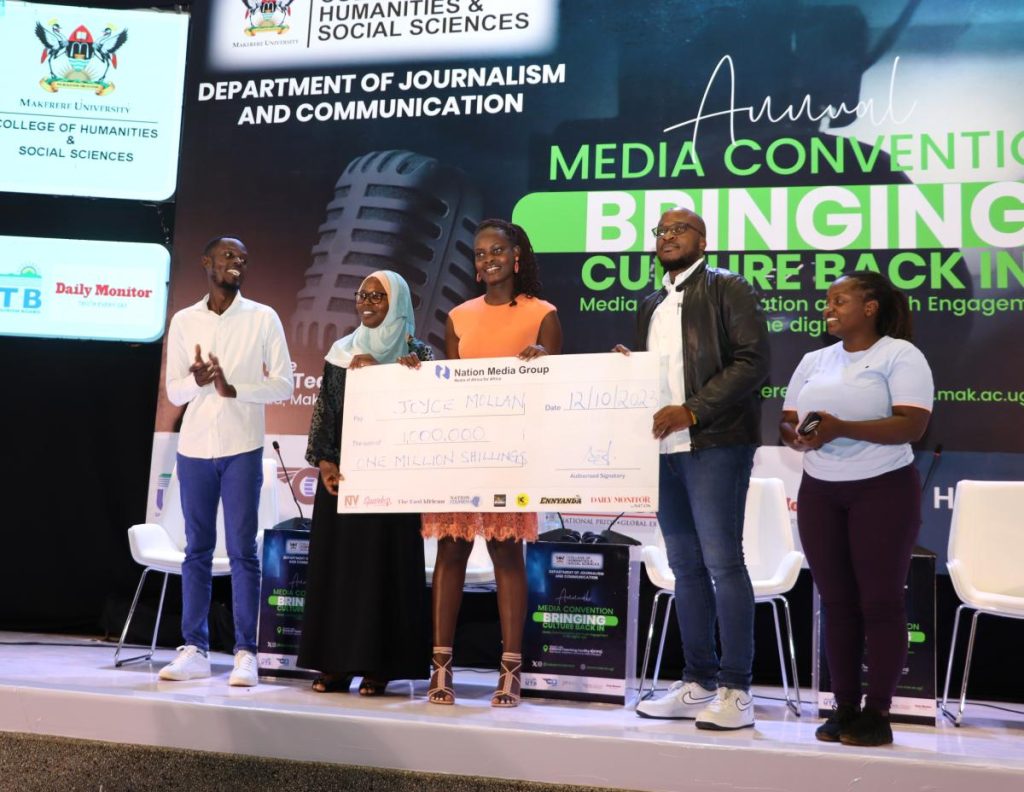
Kalinaki said this award is given in honor of Rashid Maudin and Richard Tebere. Richard Tebere was one of the founders of the Monitor Newspaper in 1992, and Rashid was on the sports desk. And they were killed in a dry riverbed by a flash flood.
“We give this award out, and I think we have pretty consistently over the last 20 years, to the best journalists in the department. It is personal to me because I think, if I’m not mistaken, that I was the winner of the first award. On top of the award, cash prize and the plaque, we give a paid internship as well. So I noticed that Joyce is already working”. He explained
To the students who are going out into the world, and those who are probably still here, Kalinaki advised that:
You probably have heard there’s a lot of turmoil or disruption in the media industry. And many of you will probably be tempted to focus on following the money and going to communications and public relations. And I think there is room for communication, and I think the world needs good communicators.
But what the world needs more than anything else, and what our country and society needs more than anything else, is credible, professional, insightful, and useful journalism that are trying to democratize societies that are trying to manage the distribution of power amongst themselves, need strong institutions to arbitrate that transition.
But the building of those institutions, whether it’s the legislature, the executive and its different branches, or the judiciary, require people who can speak truth to that power. And the discussion that we listened to this afternoon speaks about the digital landscape, so the citizen role in that holds power accountable.
So I invite you all to, whatever you end up, whether it’s in mainstream journalism, whether it’s in communication, not to lose the agency that you have to speak truth to power, to be professional, to hold people accountable, especially those that have given you power, to be citizens who work for the country that they want to live in, rather than expect someone else to do it for them.
Kababikira Mary gets the PRAU Best Communication Award
The department received support from the Public Relations Association of Uganda (PRAU), who presented the Best Communication Major Award, Kababikira Mary was the best in the Communication track. Ms. Helen Kawesa, who is an advisor at PRAU Governing Council presented the award to Kababikira. Kababikira, a student currently works with USAID, SBCA as a Communication and knowledge management intern.. She also works as a volunteer at Zente Sec, assisting the PR and marketing team to handle the company’s social media platforms.
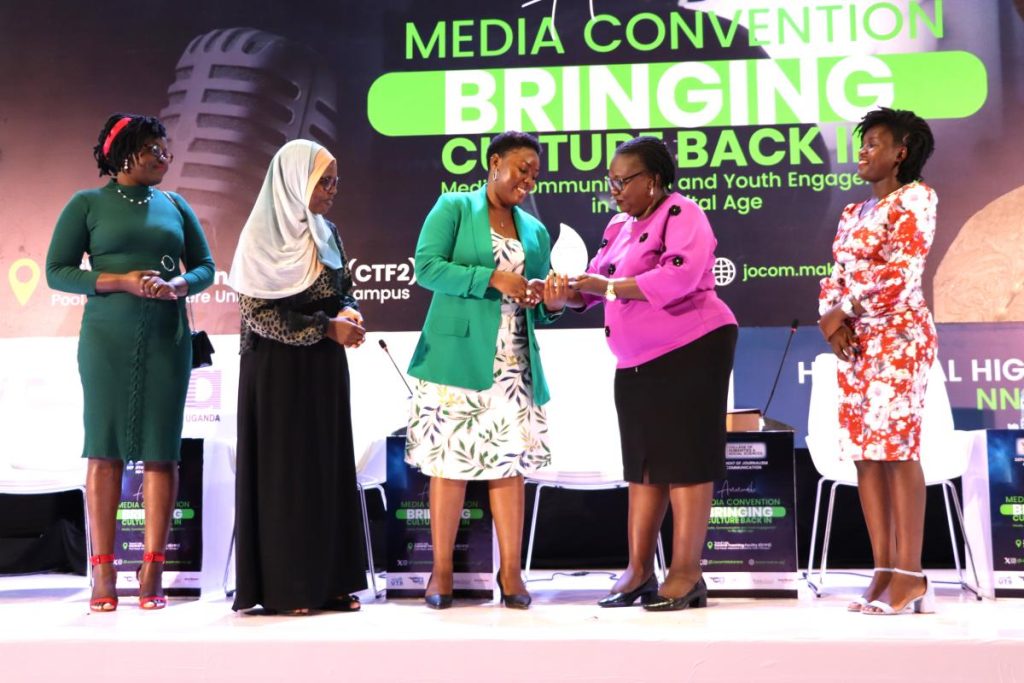
Ms. Helen Kawesa works in the Parliament of Uganda. She thanked Makerere University for inviting PRAU to be part of this annual media convention.
“We have a partnership with the department, and every year we award the best communication students in the academic year. I’m very happy to have the best communication students in the Department of Journalism at Makerere University. So congratulations Mary. And I’m so happy that today all the winners are ladies. Ladies, communication is our field. So let’s thrive and take it away from this gentleman in a good way.
In PRAU we give our plaque. Then we have another package also of our internship. So you’ll be an intern for one year at the Node Group. Node Group is one of the biggest PR firms now in Uganda. Exciting. We give you membership in the PR Association of Uganda for one year, so starting January next year, you have free membership in that association, which is a very good one .. And then, next month, we have an East African PR week. We are hosting a very big conference where all the East African countries are coming together, practitioners are coming together from East Africa for a week in a conference which will be in Jinja. The cost of that attendance is 1.6 million. So we are giving you free attendance to that conference, that’s your crown. You’ll be able to hold on with the high and mighty in the PR field, not only in Uganda, but in East Africa. And I’m sure from there, we’ll only hear about you flying high. So congratulations to you, Mary. Wish you the best.
And, let us emphasize the professionalism in whatever field we are doing. In communications, it’s not easy, but if we are professional, we take it further and we do bigger” , Kawesa advised.
You may like
-
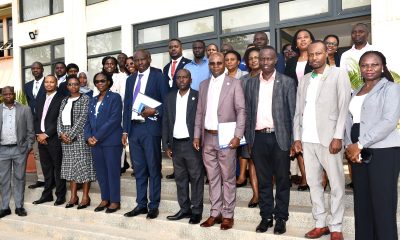

Parliament, MoFPD and Makerere Launch Five-Day Training on Integrated Macroeconomic Modelling to Strengthen Fiscal Oversight
-


Meet Najjuka Whitney, The Girl Who Missed Law and Found Her Voice
-
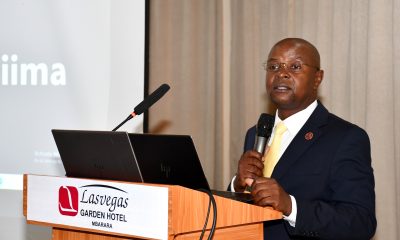

Building Skills for Better Public Investments: PIM Centre Trains Public Sector Economists
-


From Adversity to Excellence: The Inspiring Journey of Makerere’s Best Science Student, Esther Ziribaggwa
-


Makerere University Leaders Call for Excellence in Research and Supervision as Academic Staff and PhD Students Receive Certificates
-
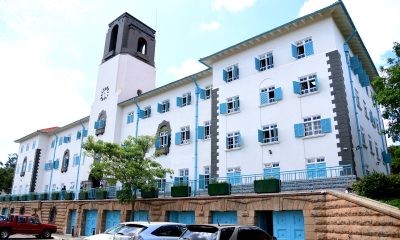

US$ 162m KEXIM Loan Approval Timely for Makerere University
Humanities & Social Sciences
Meet Najjuka Whitney, The Girl Who Missed Law and Found Her Voice
Published
6 days agoon
February 23, 2026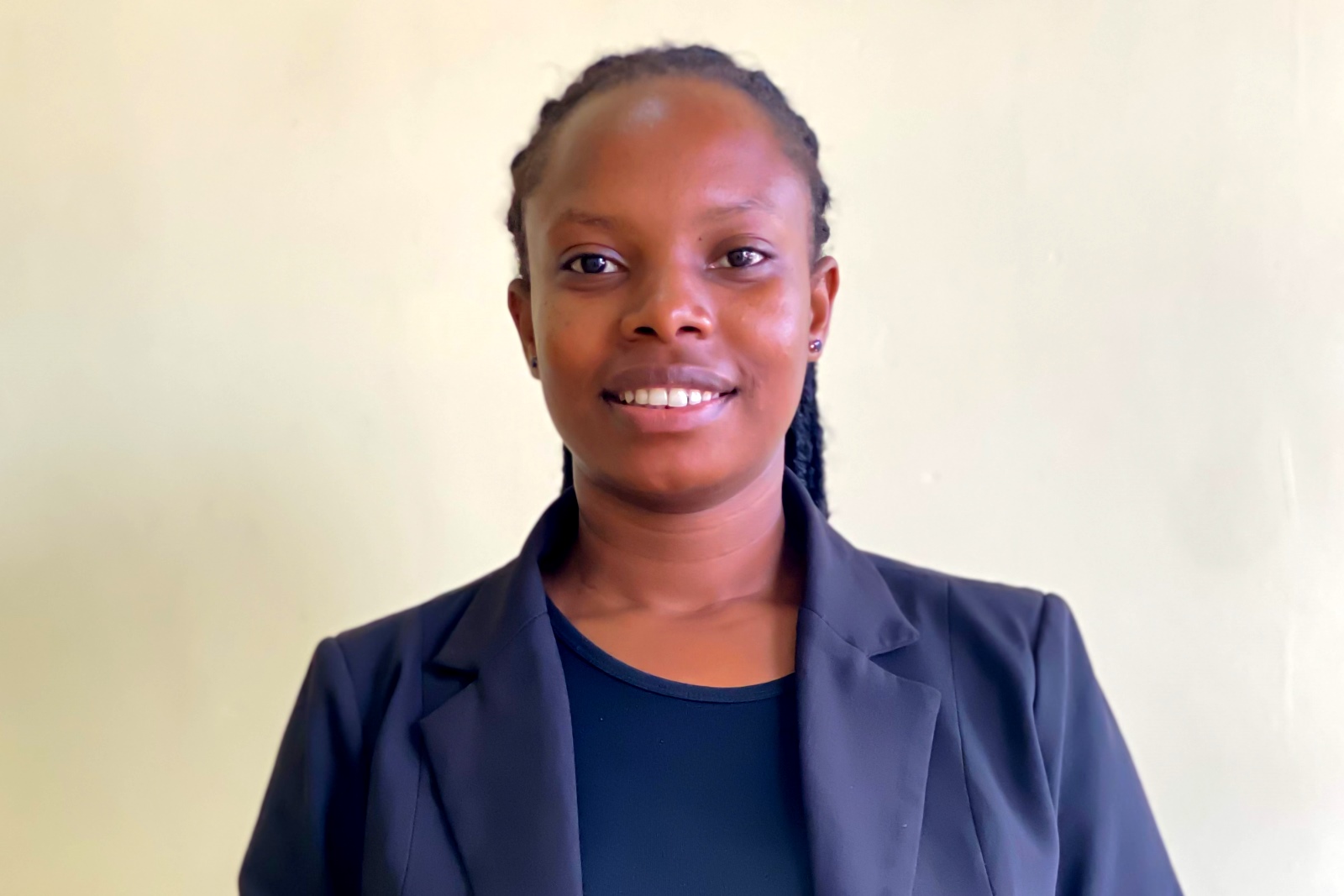
On the morning of Friday, February 27, when the academic procession winds its way across Makerere University’s Freedom Square for the last day of the 76th Graduation Ceremony, Whitney Najjuka will walk into history with a number beside her name: 4.46.
At Makerere, that number means First Class Honours. It means the Vice Chancellor’s List. It means she graduates as the only First-Class student in Journalism and Communication this year. But numbers, as Whitney has learned, rarely tell the full story.
Born on March 27, 2002, in Nabbingo, Kyengera Town Council, to Margaret Kusemererwa and Fred Kasirye, dreamt she would do Law, one of the disciplines, prestigious, almost inevitable next steps for a student who had excelled in secondary school. She had done everything correctly. Studied hard. Scored well. Followed the script.
But Makerere University had other plans. She missed the pre-entry mark, but found her name under Journalism and Communication, another prestigious course offered by the Journalism and Communication Department at Makerere University.
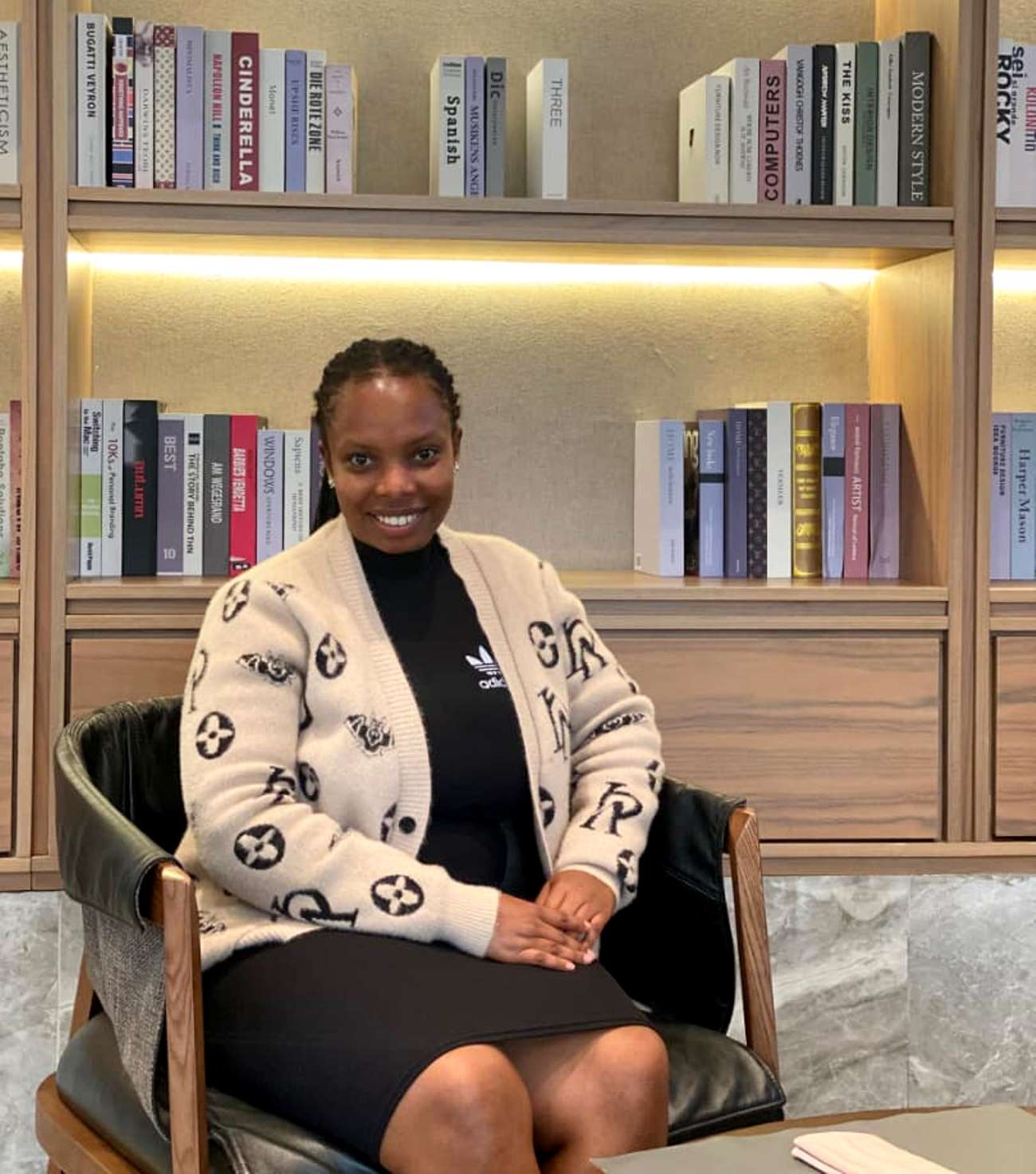
Najjuka began her academic journey at Muto Primary School in Buwama, earning 8 aggregates in the Primary Leaving Examination, a performance that positioned her strongly for secondary school.
She would later join St. Lucia Hill School, Namagoma, where she earned 20 aggregates at O-Level and 17 points in History, Luganda, and Divinity at A-Level.
Missing her dream course, Law, felt at first, like a detour. But Whitney was encouraged by Sanyu Christopher, her uncle, and she settled for a government-sponsored slot in the Bachelor of Journalism and Communication at Makerere, which she had applied for before.
She entered uncertain. But she graduates transformed.
The Pivot That Became a Purpose
Whitney speaks of her early university days with candor. She did not arrive at the Department of Journalism and Communication with a burning childhood ambition to be a journalist, but because another door had closed.
Then, Social and Behavior Change Communication happened. Applied Strategic Communication happened. She began to see media not as headlines and microphones, but as architecture, shaping how societies think, argue, and act.
The turning point came in her third year. The Female Journalist Foundation published her story on Sexual Gender-Based Violence (SGBV) and its emotional toll on survivors. What startled her was not its publication but the reaction. Comments flooded in. Debates ignited, especially about the role of men in combating GBV.
“I realized media doesn’t just report,” she says. “It frames how society views a crisis.”
Her voice, once tentative, had entered a national conversation.
The Discipline Behind 4.46
At Makerere University, a First Class CGPA is not built on brilliance alone but on ritual.
Whitney’s ritual began with showing up, on time, every time. She treated lectures as appointments with her future self. She refused to confine her learning to the syllabus. While attending workshops at the Aga Khan Graduate School of Media and Communication and obtaining external certifications, she sought and was open to mentorship through the Public Relations Association of Uganda (PRAU).
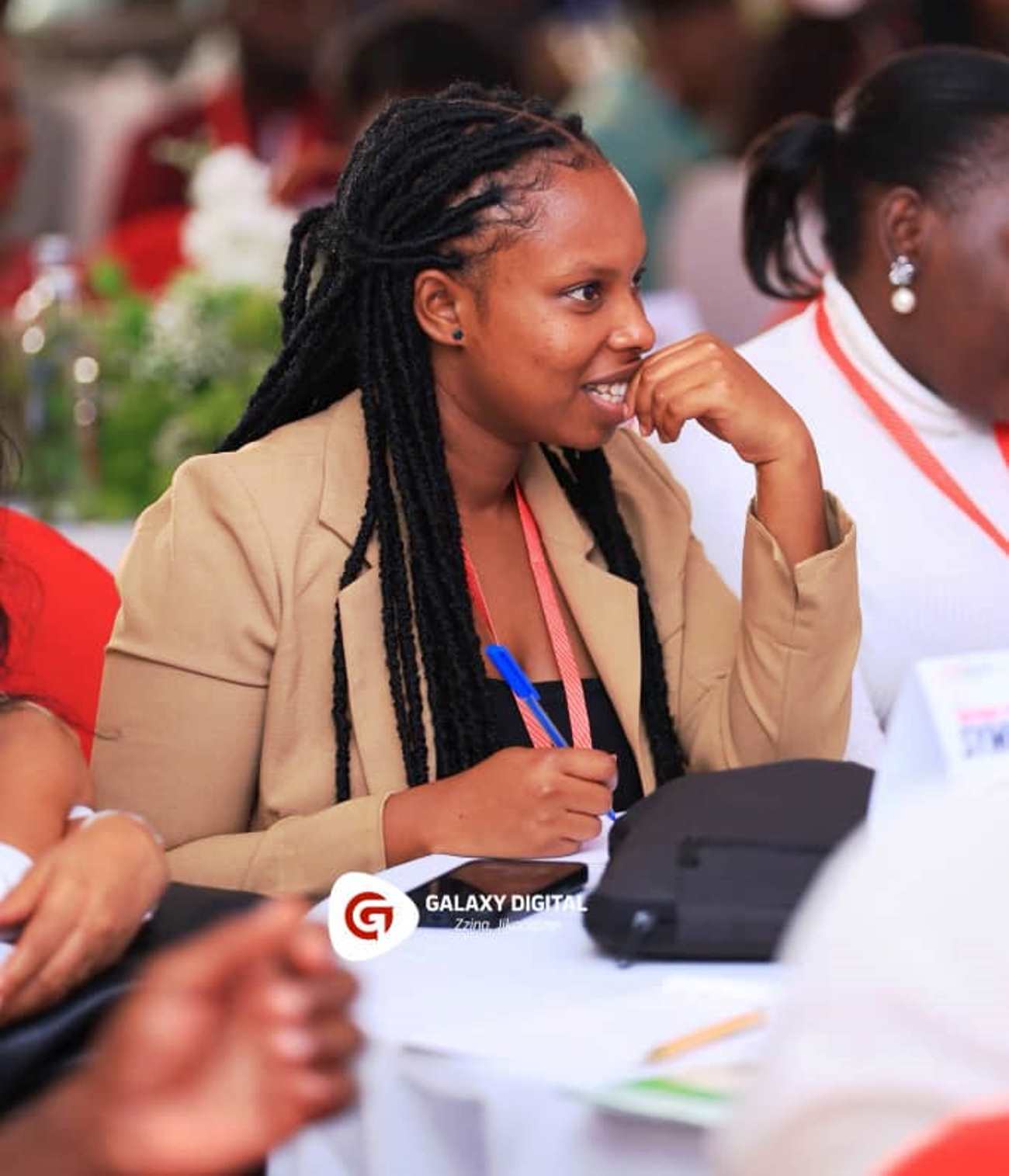
She wanted theory anchored in practice. And then there was the commute.
From Nabbingo, a hill in Wakiso District, some 18.6 km to Kampala, where the Makerere Main campus is situated, and back, nearly 20 hours a week dissolved into Kampala traffic. Two-hour journeys before 8:00 a.m. lectures. Dust. Noise. Headaches. She learned to manage energy the way others manage time. Fatigue became a tutor in resilience.
“I had to be intentional with every remaining hour,” she says. “Excuses were not an option.”
Learning to Practice Communication
If classrooms taught her analysis, presentations taught her courage. Pitching projects, defending research, and standing before peers quick to critique forced her to think on her feet. She was no longer simply studying communication; she was practicing it.
In 2024, the AGMES Fellowship at the Aga Khan Graduate School of Media and Communication pushed her further. She received funding to produce a capstone project on the mental impact of gender-based violence on survivors. She identified sources, conducted interviews, handled trauma with care, and worked with professional editors.
The Communication, she learned, is logistics and ethics as much as eloquence.
The Future She Sees
Whitney is optimistic about Uganda’s media landscape. The digital shift, she believes, has democratized influence. Young communicators are no longer confined to legacy newsrooms or offices.
Yet she sees a gap in the absence of structured research on sustainable, ethical, profitable independent media ventures in Uganda. Her ambition is not only to practice communication, but to study it. To produce data-backed frameworks that help young Ugandans transition from graduates to media entrepreneurs.
She wants to make the impact scalable.
What Remains
As the only First-Class graduate in her cohort, she is careful not to mythologize herself. “Success isn’t brilliance alone,” she says. “It’s a daily commitment when nobody is watching.”
Even before graduation, Whitney had stepped into the industry through a mentorship internship at Capital One Group (COG EA Ltd), a strategic marketing communications agency operating across East Africa.
At Capital One Group, we spoke to Paul Mwirigi Muriungi, the Managing Director and Head of Strategy, who spoke of Najjuka as a progressive and intentional young professional who approaches her work with curiosity, maturity, and responsibility.
“Her attitude is exemplary. She is teachable, receptive to feedback, and eager to grow. While technical skills can be taught, character, work ethic, and mindset determine long-term success, qualities that Whitney consistently demonstrates. Given her academic excellence and professional application, we believe she has a bright future both at Capital One Group and within the wider communications industry. She represents the kind of talent the profession needs: thoughtful, adaptable, and committed to excellence.
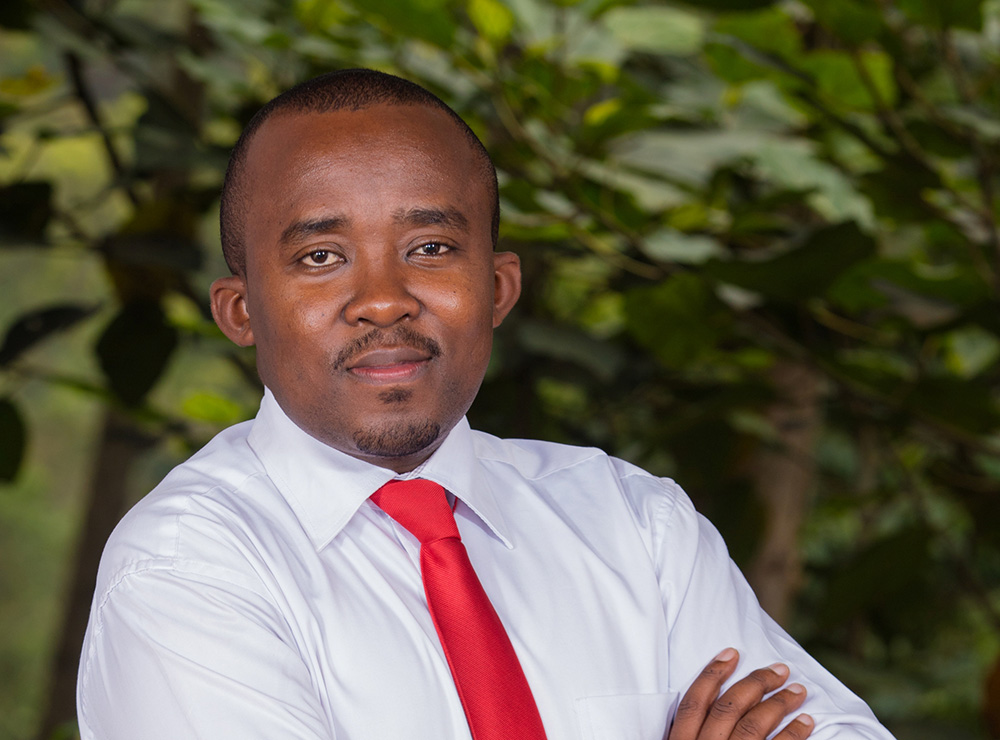
“We look forward to seeing her next chapter unfold,” says Mwirigi.
Najjuka’s gaze extends beyond her own trajectory. She speaks of what the Department could become. Furnished and equipped with industry-standard equipment, newsroom simulations, and deeper investment in data journalism as prayers. Her excellence is not self-congratulatory, but it is forward-looking.
“The University should support the Department to procure industry-standard equipment. Access to high-quality cameras, sound booths, and updated editing software like Adobe Creative Suite is critical to our learning environment,” she says.
Adding that, “We need a newsroom simulation, a physical or digital space where students work under real-time deadlines to produce content for the public. That would prepare us for industry and even strengthen the University’s own media platforms.”
In an era defined by metrics, algorithms, and digital traceability, data journalism is no longer a niche skill but a sine qua non of credible reporting. “There should also be more focus on data journalism and search engine optimization. These are no longer optional skills. Students would benefit immensely from stronger training in these areas.”
Dr. Aisha Nakiwala, the Head, Department of Journalism and Communication, says the faculty are very proud that she is graduating with a First Class—the only one in this year’s cohort.
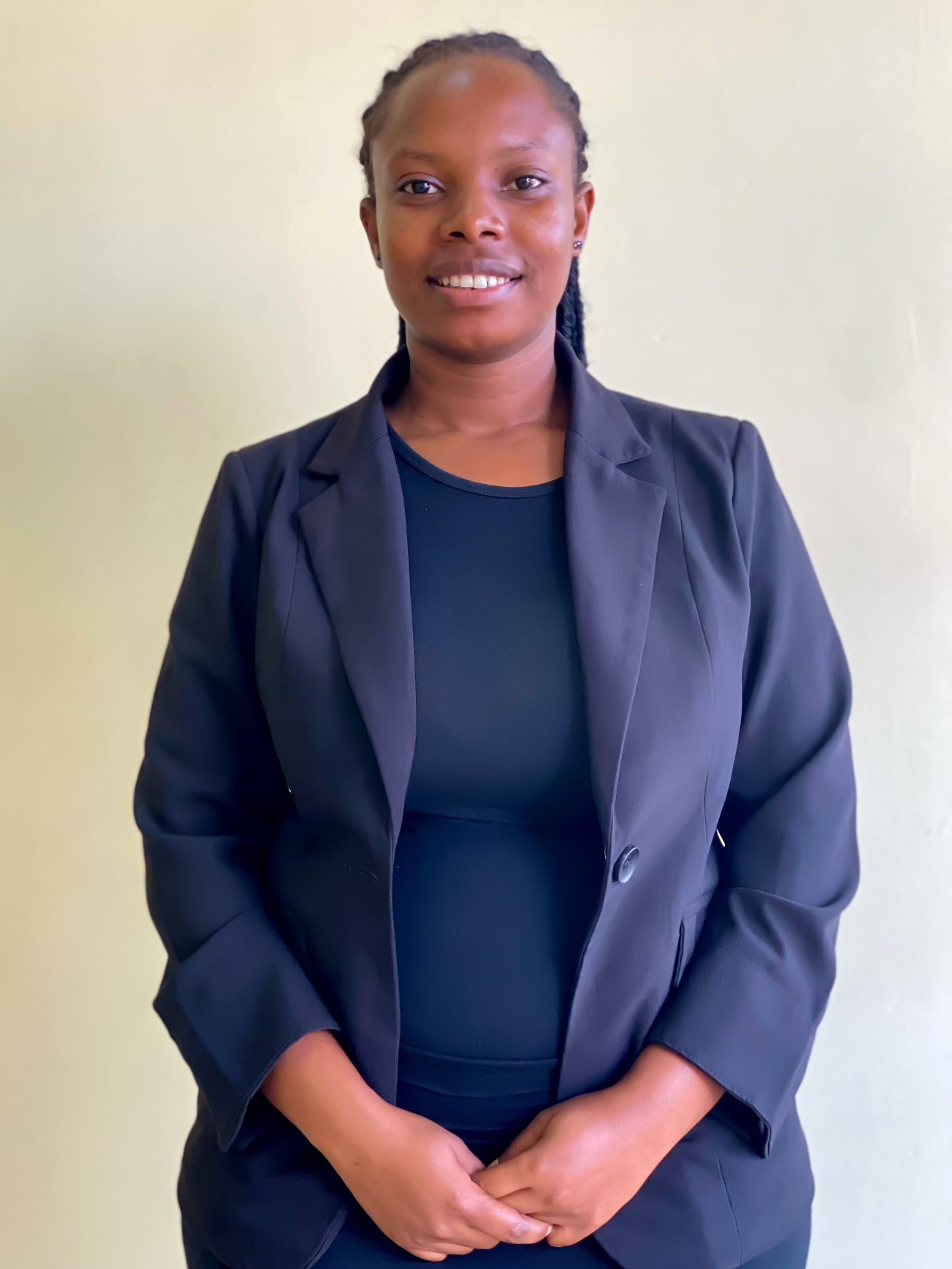
“This achievement reflects not only exceptional intellectual ability but also discipline, resilience, and sustained dedication to the highest standards over four years. Graduating with first-class honors is no small feat; it requires consistent outstanding performance.
“Her accomplishment sets a powerful example for continuing students and reaffirms our department’s commitment to nurturing excellence. We are confident she will make meaningful contributions to the communication profession and society at large,” says Dr. Nakiwala.
On graduation day, applause will crest and recede. The gowns will fold back into wardrobes. The transcripts will be filed away in cabinets. But something quieter will endure; a young woman from Nabbingo who once missed her Law mark, who spent 20 hours a week on the road, who discovered that storytelling is power, and who now walks into Freedom Square not by accident, but by intention.
Life, as she has come to understand it, lives on.
Humanities & Social Sciences
Dr. Pamela Khanakwa Honored for Steering Record 18 PhD Candidates for the Mak 2026 Graduation
Published
1 month agoon
January 23, 2026By
Jane Anyango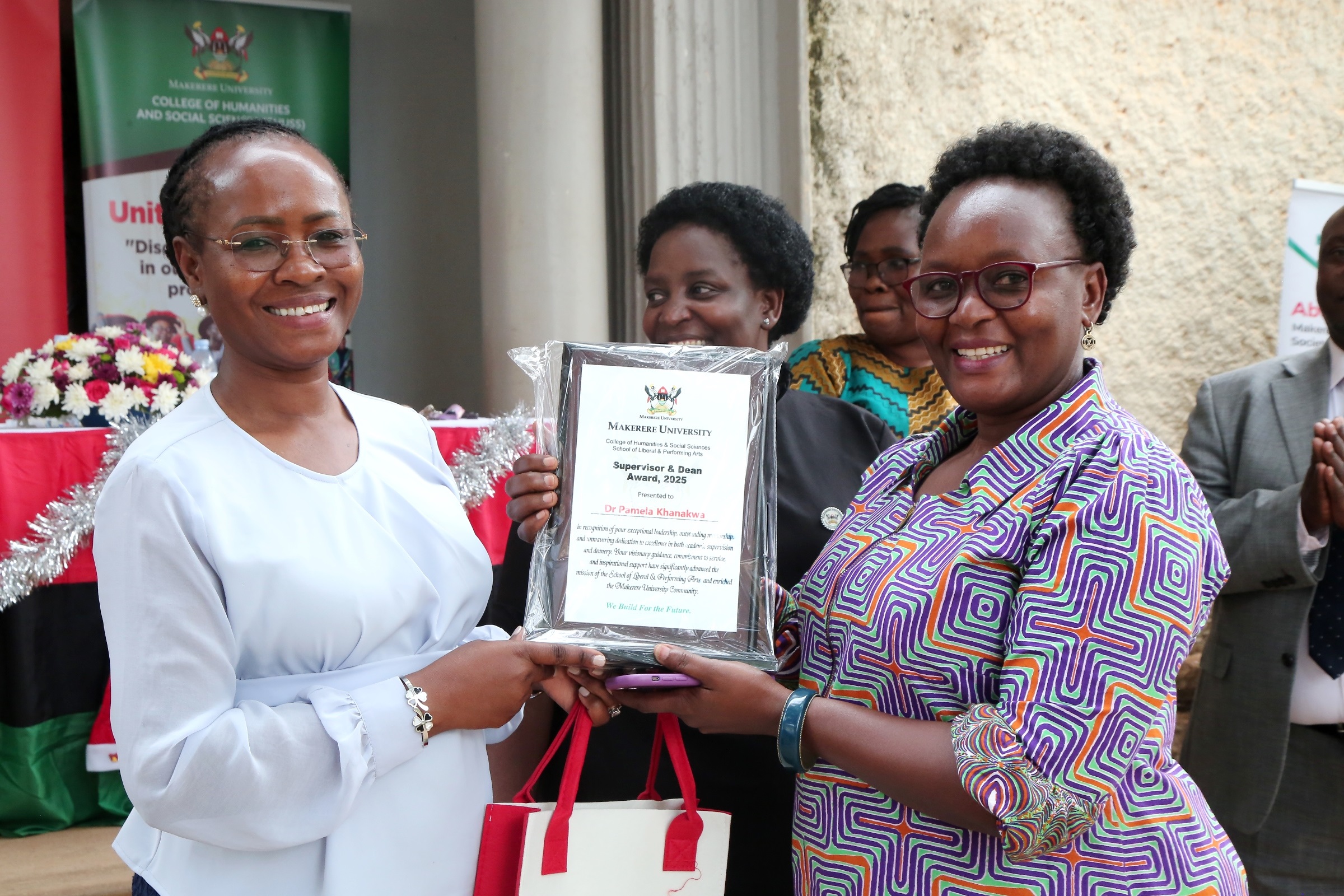
Six personally supervised, three completed in record time, as School of Liberal and Performing Arts sets a historic milestone. Dr. Pamela Khanakwa got the Award as Best PhD Supervisor and Dean
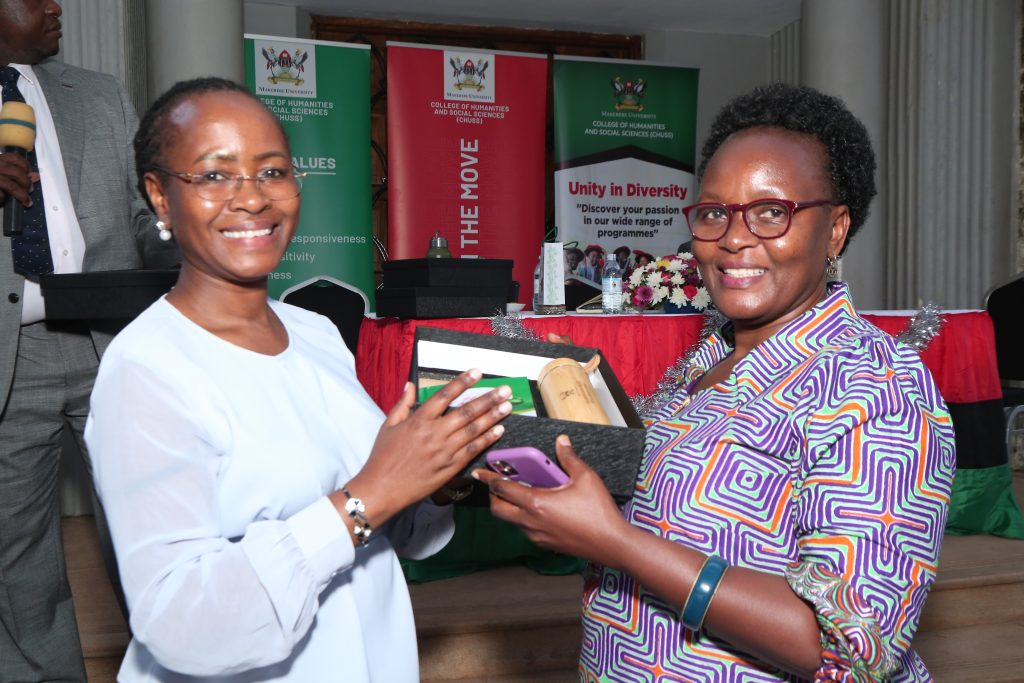
A Historic Academic Milestone for SLPA
The College of Humanities and Social Sciences (CHUSS) recognised the Dean of the School of Liberal and Performing Arts (SLPA), Dr. Pamela Khanakwa, for outstanding academic leadership that has seen the School field 18 PhD candidates for the next 2026 Makerere University Graduation Ceremony scheduled for 24th-27th February. Remarkably, six of these doctoral graduates were directly supervised by Dr. Khanakwa, with three completing within the official three-year timeframe, an exceptional achievement in graduate training. The recognition was announced during the CHUSS End-of-Year Get-Together, where staff applauded Dr. Khanakwa’s dedication, humility, and relentless commitment to postgraduate supervision and timely completion.
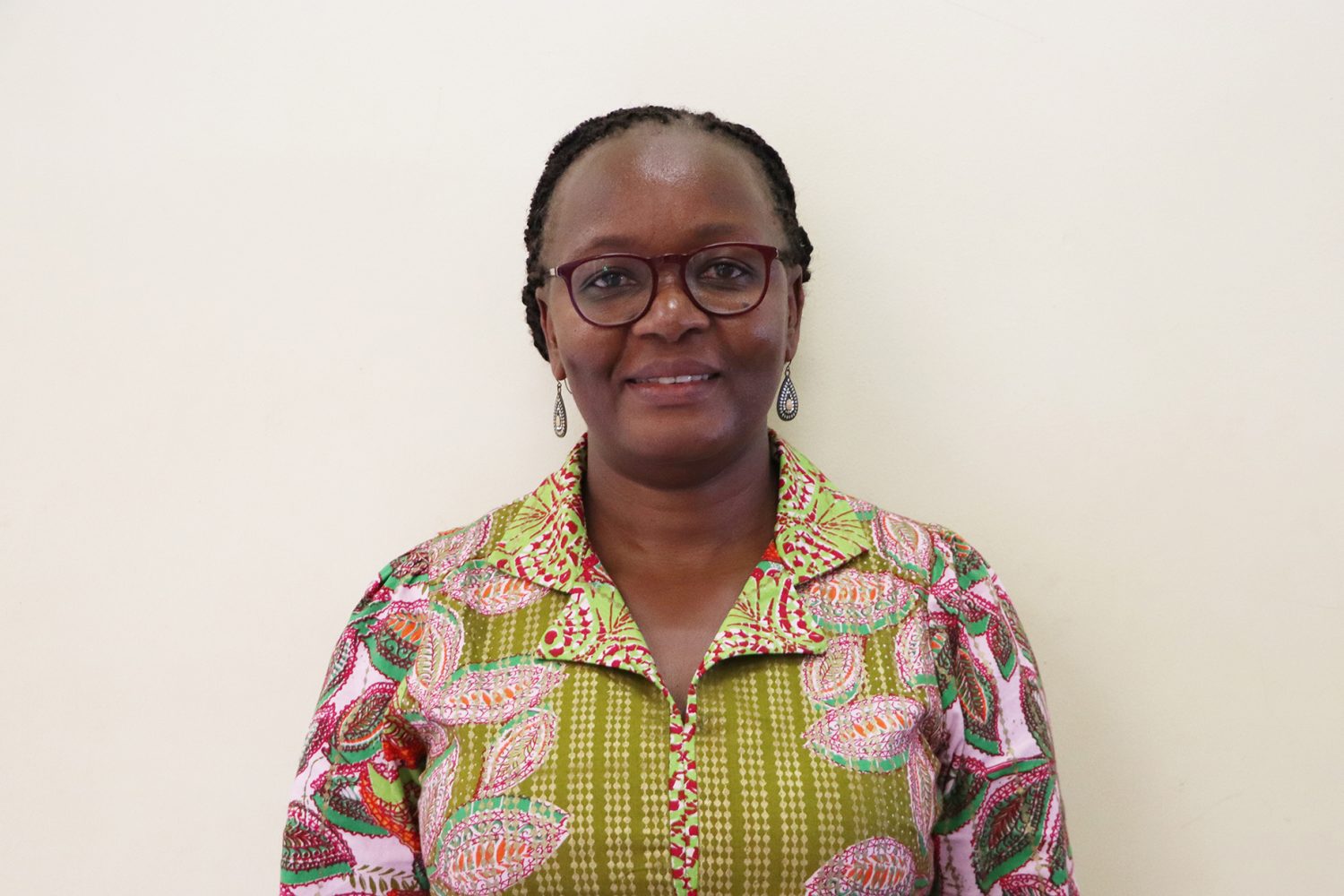
Message to Academic Staff
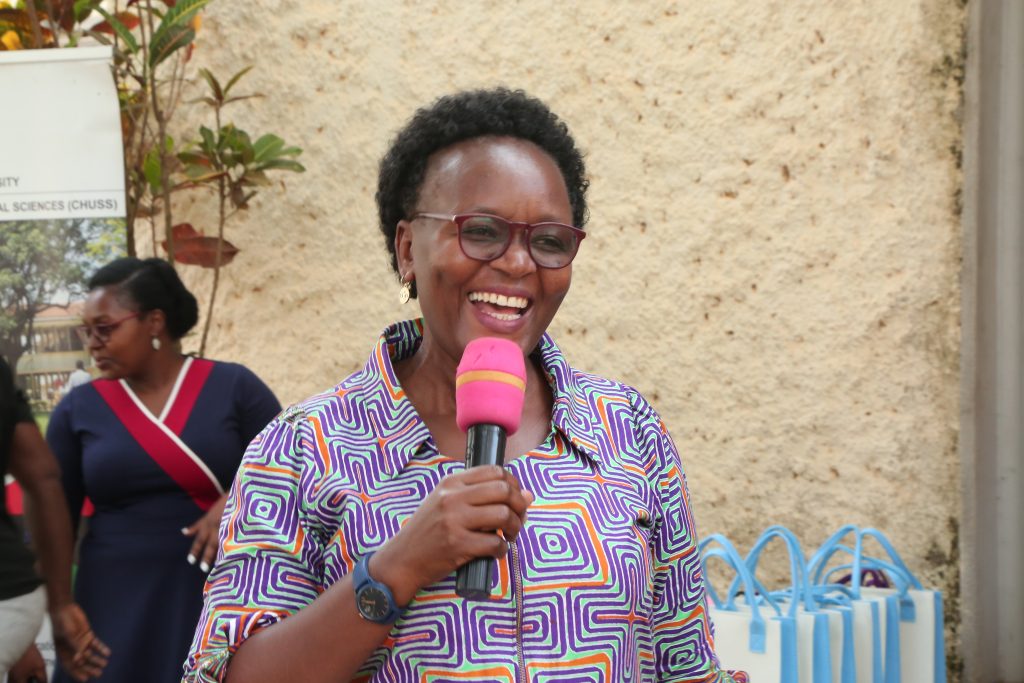
Q: What message do you have for your staff following this achievement?
Dr. Khanakwa:
First, I celebrate my staff and thank them for their dedication to supervision and student support. Academic work is demanding, and material rewards are often limited, but the true satisfaction comes from seeing students succeed.
I encourage my colleagues to remain committed. Yes, the workload is heavy, but many things are possible with dedication and teamwork. Let us continue working for the good of our students, our School, and Makerere University.
Leadership Rooted in Humility
Q: Many colleagues describe you as humble, down to earth, and hardworking. What shapes this character?
Dr. Khanakwa:
I think it is largely my upbringing. My mother was a primary school teacher from the 1950s until the mid-1980s. She worked extremely hard to raise us, combining teaching with farming to ensure we had school fees and basic needs. From her, I learned humility, discipline, and the value of hard work.
I also learned that leadership positions are temporary. You occupy them today, and tomorrow you move on. So humility is essential.
My graduate training also shaped me significantly. My PhD supervisor emphasized that graduate study is a full-time job and that results matter more than noise. Let people see your work through outcomes, not announcements.
Supervision as a Two-Way Commitment
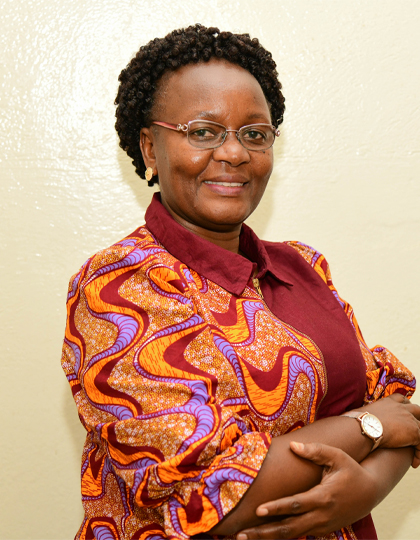
Q: How would you describe your supervision style?
Dr. Khanakwa:
I read my students’ work thoroughly, word by word. Sometimes my comments are tough, but they are honest. Supervision is a two-way commitment. I give feedback, but students must also respond and remain engaged. When that relationship works, progress happens.
Balancing Leadership, Scholarship, and Family
Q: How do you balance being a Dean, scholar, wife, mother, and daughter?
Dr. Khanakwa:
Honestly, I am not sure I balance perfectly. My mother lives far away in Bukwo, so visiting requires careful planning. My children grew up understanding the demands of academic life. I pursued my PhD in the United States and spent long periods away, but we adapted as a family.
Work has become part of my lifestyle. I use weekends to read dissertations, review manuscripts, and write. Sometimes my children ask if I ever sit without working, but this is the commitment I made. As we often say jokingly, “We humbly applied for the job, so let us do the job.”
Scholarship Beyond Supervision
Dr. Khanakwa is also an active scholar and editor. In the past year alone, she has:
- Edited scholarly volumes on archives, memory, method, and pedagogy
- Published a book with Routledge Companion
- Co-authored journal articles and book chapters with graduating students, including Priscah Asiimwe and Anatoli Lwasa Mpijja
“I feel an obligation to write with students,” she notes. “It takes time, energy, and commitment, but it is part of academic mentorship.”
Who Is Dr. Pamela Khanakwa?
Dr. Pamela Khanakwa is the Dean, School of Liberal and Performing Arts, College of Humanities and Social Sciences, Makerere University. She is a seasoned scholar, supervisor, administrator, and mentor whose leadership continues to redefine graduate training excellence. Details about Dr. Pamela Khanakwa can be accessed at: https://chuss.mak.ac.ug/en/personnel/pamela-khanakwa/
More details are available in her attached curriculum vitae.
The CHUSS End- Of-Year-Get-Together
On 12th December, 2025 the college leadership organised a get-together end of year gathering to take stock of the achievements, challenges and brainstorm together on how to move forward. The event was marked by entertainment, team building games, appreciation speeches, sharing a meal and a Christmas package for every staff
Retirees and staff recognised
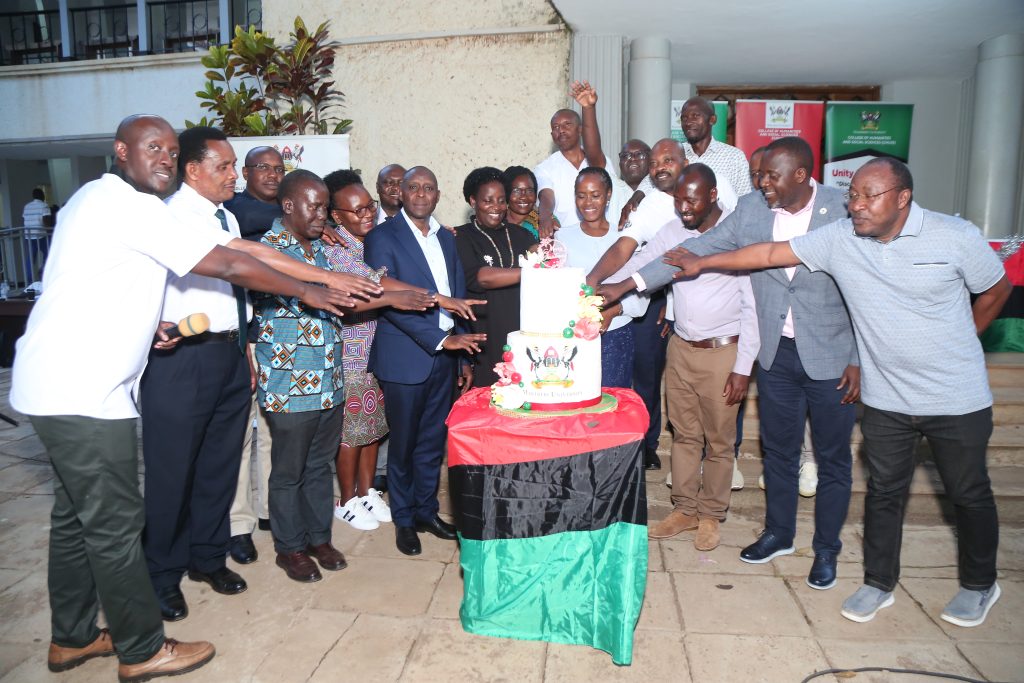
Five retired staff Dr. Micheal Wangotta Masakala, Dr. Anatole Kirigwajjo and Dr. Jackson Kizza Mukas (all from the School of Languages, Literature and Communication), Assoc. Prof. Florence Nansubuga (School of Psychology), Dr. Tusabe Gervase (School of Liberal and Perforing Arts) and Ms. Scovia Nganda Sekweyama (secretary from the School of Social Sciences) were recognised for their dedicated services to the university.
In addition to Dr. Pamela Khanakwa’s Award as Best PhD Supervisor and Dean, Ms. Birabwa Florence scooped the award of Best Registrar of the year. Birabwa is the registrar for the School of Liberal and Performing Arts.
Administrative and support staff including Ms. Mary Gyezaho and Annet Kashumbusha(both administrative secretaries in the Principals office), Farouq Lule (IT Officer), Godfrey Kakooza (cleaner), Charles Sebuguzi (driver) and Jane Anyango (Communications officer) were recognise with awards for outstanding service. Dr. Mohamed Mayanja Kajumba was from the School of Pyschology was recognised as the person with an outstanding talent in Handwriting.
The celebrations held in the Arts quadrangle were graced by the Vice Chancellor Academic Affairs Prof. Sarah Ssali and the Deputy Vice Chancellor in charge of Finance and Adminstration Prof. Ireeta Tumps.
Humanities & Social Sciences
Ugandan Journalists Trained on Peace and Gender-Sensitive Reporting Ahead of 2026 Elections
Published
2 months agoon
January 9, 2026By
Jane Anyango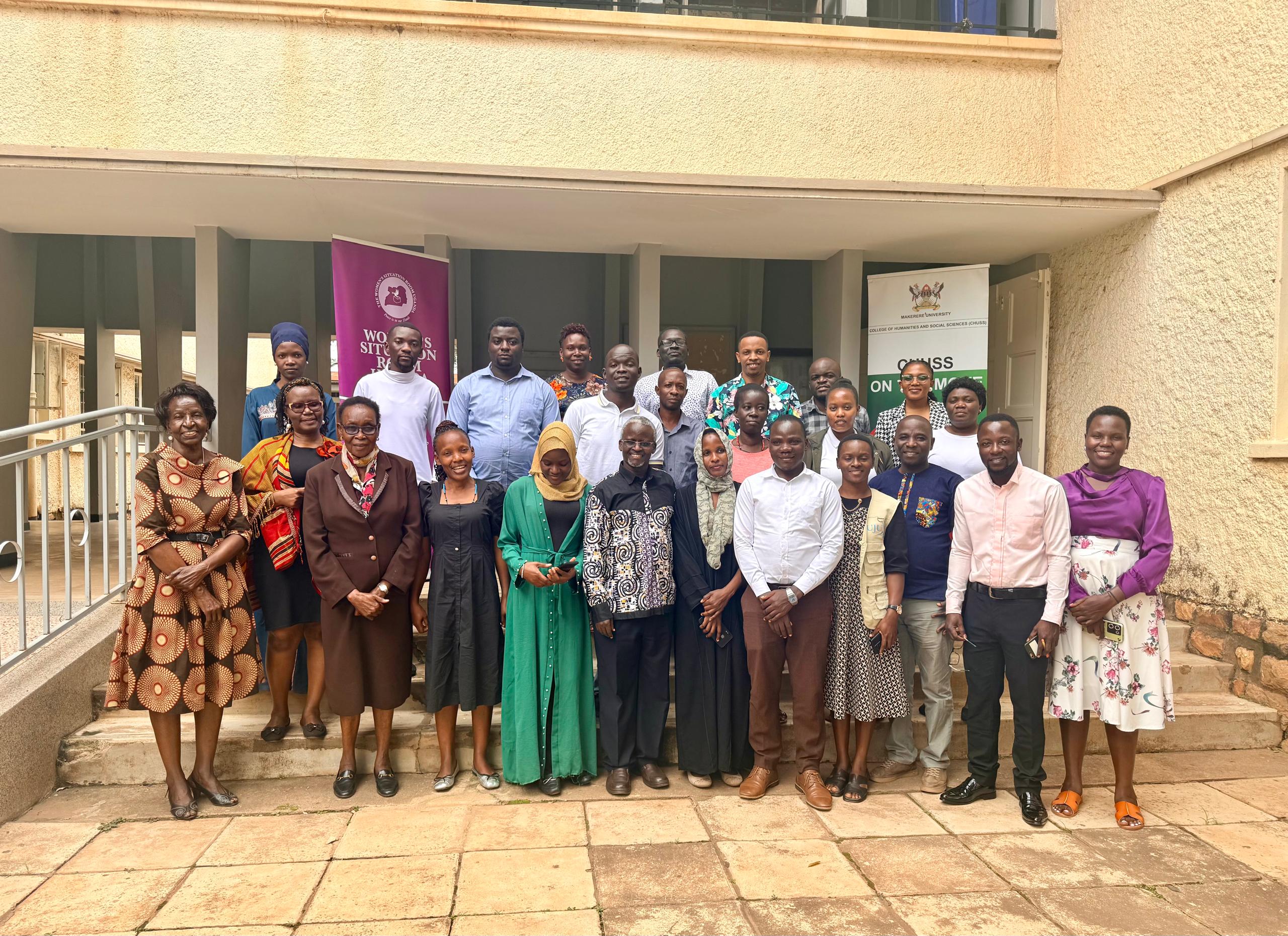
Kampala, Uganda – January 9, 2026
Ahead of the January 15 general elections, Ugandan journalists have undergone specialized training on peace and gender-sensitive reporting to ensure responsible media coverage during the election period. The two-day training, held from 8th to 9th January 2026 at Makerere University’s College of Humanities and Social Sciences Smart Room, was organized by the Women’s Situation Room (WSR) in partnership with various stakeholders and brought together journalists from across print, broadcast, and online platforms.
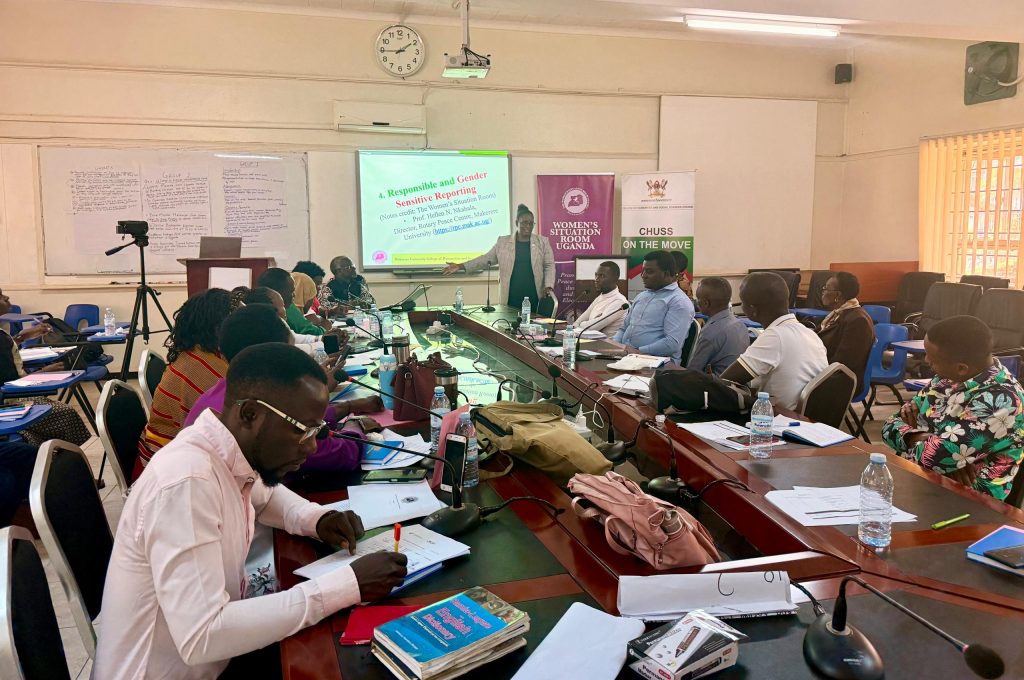
The main objective of the training was to strengthen the capacities of media in reporting and documenting electoral processes in a responsible and gender-sensitive manner. The specific objectives included: strengthening journalists’ skills to cover the 2026 elections in a fair, balanced, gender-sensitive, and non-violent partisan way; enhancing the role of media to enable citizens to be well-informed and actively participate in the election process; ensuring focused and balanced reporting on peace during and after elections; and strengthening partnerships between the WSR and media houses during the election period.
The training covered multiple critical modules. Day one focused on responsible conflict-sensitive reporting, emphasizing principles such as balance, impartiality, and accuracy. Participants explored the role of media as a relayer of the population’s voice, election monitor, catalyst for social cohesion and reconciliation, contributor to the accountability of political actors, and a platform for detecting and debunking digital media misinformation and hate speech.
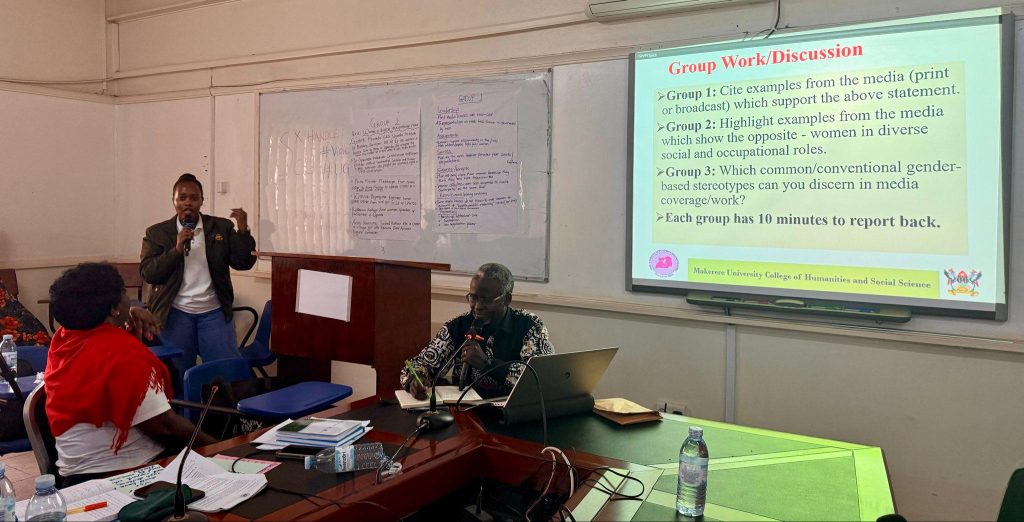
Day two addressed responsible and gender-sensitive reporting. Key aspects included the definition of gender-sensitive reporting, how to become a gender-sensitive reporter, critical elements in reporting with gender awareness, packaging gender-sensitive stories, and a checklist for detecting and avoiding gender-insensitive reporting.
Her Lordship, retired Judge Justice Mary Mayitum, emphasized the importance of peace as the foundation of development and democratic engagement. “Because we value peace more than anything. Without peace, really, you can do nothing. But where there is peace, you can have time to reflect, discuss with others, and join in meaningful dialogue,” she said. She warned that the country’s past conflicts, such as those in Gulu, underscored the necessity of maintaining national harmony.
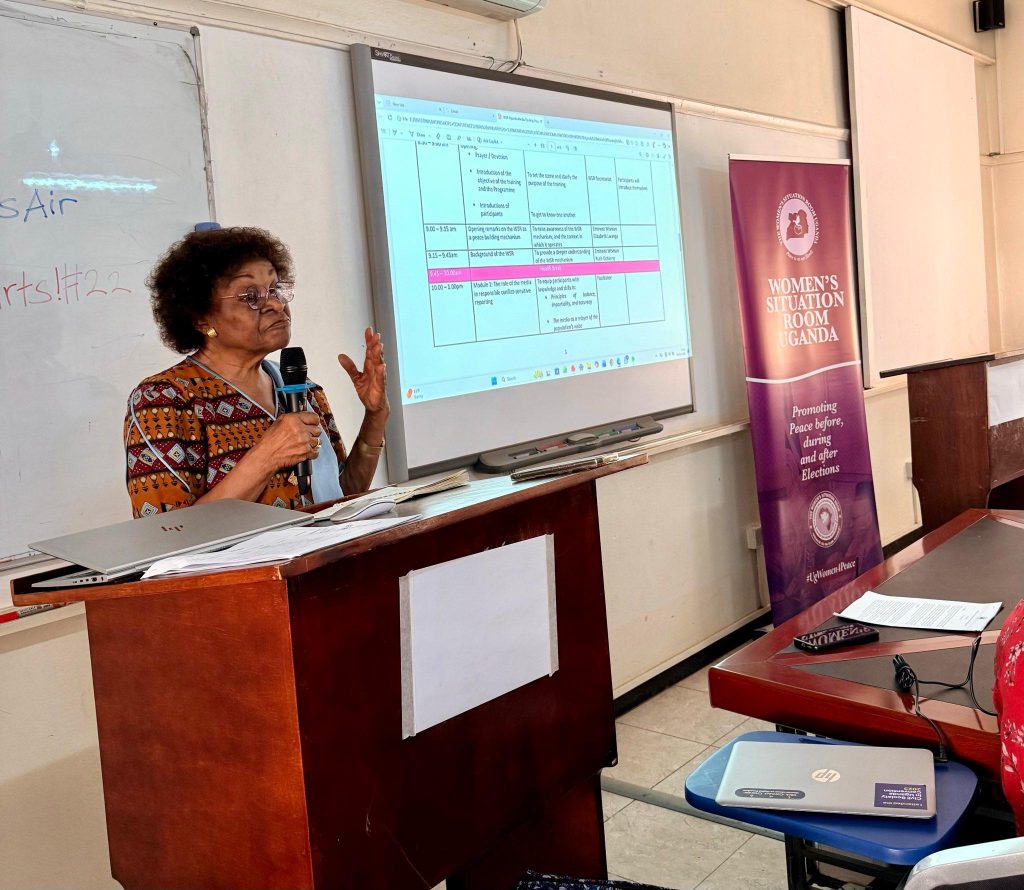
Justice Mayitum also urged other key election stakeholders to uphold peaceful conduct. “Being peaceful is the very heart of life. We have spoken to police, security personnel, political parties, and the Electoral Commission. We want politicians to have a code of conduct and to understand that it’s okay to think differently without fighting or hating one another,” she added.
Dr. William Tayebwa, lead facilitator and senior lecturer in the Department of Journalism and Communication at Makerere University, said, “This training is about conflict-sensitive reporting, peace journalism, and gender-sensitive reporting in the context of the elections. The emphasis was on giving female political candidates a voice while ensuring journalists report responsibly on election-related matters.”
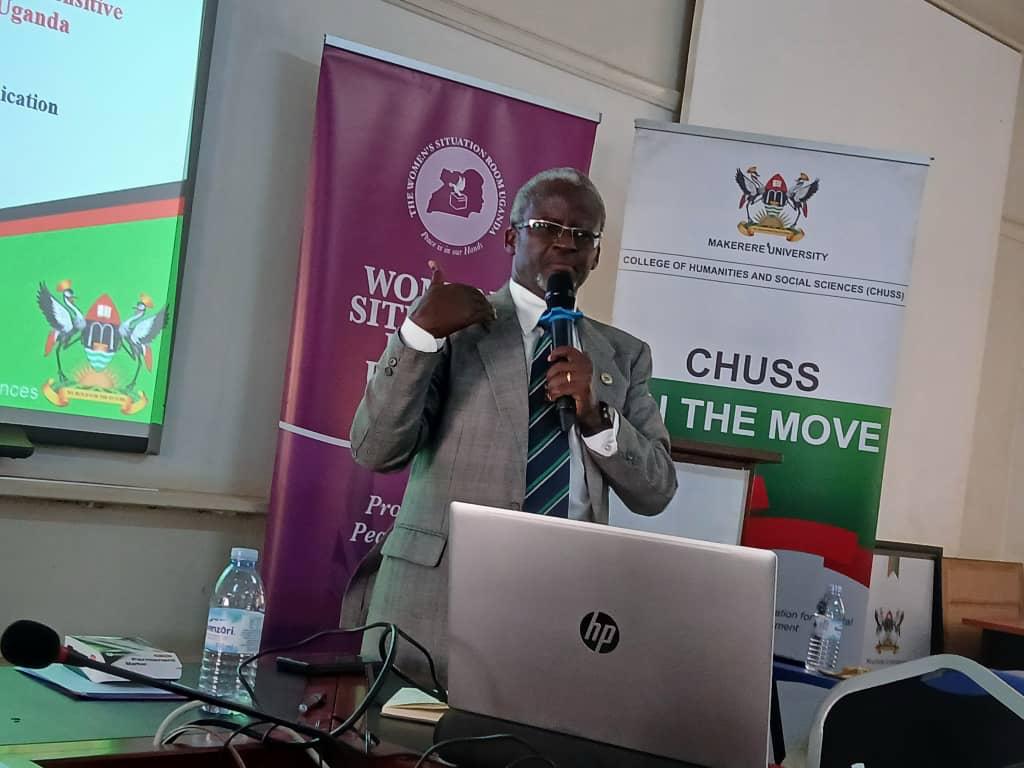
Participants described the training as timely and impactful. Tony Banizengabo of CBS Wakiso District said, “We’ve benefited a lot. We’ve been trained to write stories which bring peace, not conflict. Ahead of the elections, we are very ready to be part of peacemakers.”
Dorcas Kimono of UBC TV Kampala added, “It was so timely and rich. We learned how to report without promoting or fueling violence, giving voice to victims without angering them or encouraging violators. This is very vital, especially as we approach the 2026 elections.”
The training aims to equip media personnel with the knowledge and skills to uphold professional ethics while contributing to a peaceful, inclusive, and gender-sensitive electoral process.
Trending
-

 Humanities & Social Sciences6 days ago
Humanities & Social Sciences6 days agoMeet Najjuka Whitney, The Girl Who Missed Law and Found Her Voice
-

 Health1 week ago
Health1 week agoUganda has until 2030 to end Open Defecation as Ntaro’s PhD Examines Kabale’s Progress
-

 General5 days ago
General5 days ago76th Graduation Highlights
-

 Agriculture & Environment1 week ago
Agriculture & Environment1 week agoUganda Martyrs Namugongo Students Turn Organic Waste into Soap in an Innovative School Project on Sustainable Waste Management
-

 General2 weeks ago
General2 weeks agoMastercard Foundation Scholars embrace and honour their rich cultural diversity
